Annual Report 2023
Prepared by Heidi Mander, General Manager

Prepared by Heidi Mander, General Manager
As we reflect on the past year, we draft this foreword for USASA’s 2023 Annual Report with a mix of pride and awe. The journey through this year has been nothing short of extraordinary, marked by significant challenges and equally remarkable achievements that have shaped the landscape of USASA and UniSA in unprecedented ways.
The Student Voice project stands as a testament to our commitment to amplifying student concerns and aspirations, a milestone that we achieved alongside fortifying USASA’s volunteer program and revolutionising our retail spaces to better align with the evolving needs of our students. The inauguration of the Clubhouse, the launch of a reconciliation strategy, the implementation of the preferred name project, and the expansion of mental and financial wellbeing programs underscore our ongoing dedication to creating an inclusive, supportive, and empowering environment for all students. These initiatives and the University’s continued financial support signify our collective efforts to enhance student life on campus.
Perhaps the most transformative development of 2023 was our contribution to establishing the new Adelaide University—a landmark change for the Australian higher education sector. This endeavour reflects the interests and voices of our students at the core of the new University’s vision and embodies the founding ideals of USASA, reinforcing the importance of student representation in shaping educational landscapes.
This year we marked a significant evolution in USASA’s operational dynamics, with almost a total return to campus activities. Our events scaled new heights, our services reached more students, and, most importantly, our presence and purpose resonated more profoundly with the student body than ever before.
This year’s journey saw notable leadership changes in USASA, with four remarkable individuals steering the organisation through its various phases.
We said goodbye to CEO Daniel Randell, who served for a decade and contributed immensely to USASA’s growth and innovation. Under Daniel’s leadership, USASA revitalised its branding, introduced diverse student-centric initiatives, and fostered a vibrant campus community. His commitment to staff wellness, team cohesion, and a culture of appreciation has left an indelible mark on our organisation. While we recruited a new leader, acting General Managers (GM) Luis Gardeazabal and Jackson Polley led USASA’s operations.
In September, the board welcomed Heidi Mander as the new General Manager, whose expertise in leadership and NFP mergers from her tenure as Group CEO of the Can:Do Group promises to usher in a new era of growth and excellence for USASA. Throughout Isaac’s presidency, the board remained steadfast in its vision of a student organisation that places student empowerment at its core—a vision that, while significantly realised, continues to inspire our efforts and future directions.
As we pen this foreword, it’s with the knowledge that while our journey has been fruitful, the road ahead is laden with opportunities and challenges alike. However, we stand confident that the new leadership of USASA is perfectly poised to navigate these waters, propelled by the strong foundation we’ve built and the unwavering spirit of empowerment that defines us.
Here’s to a future where USASA continues to thrive, innovate, and empower — making every aspect of university life enriching and accessible to all students.


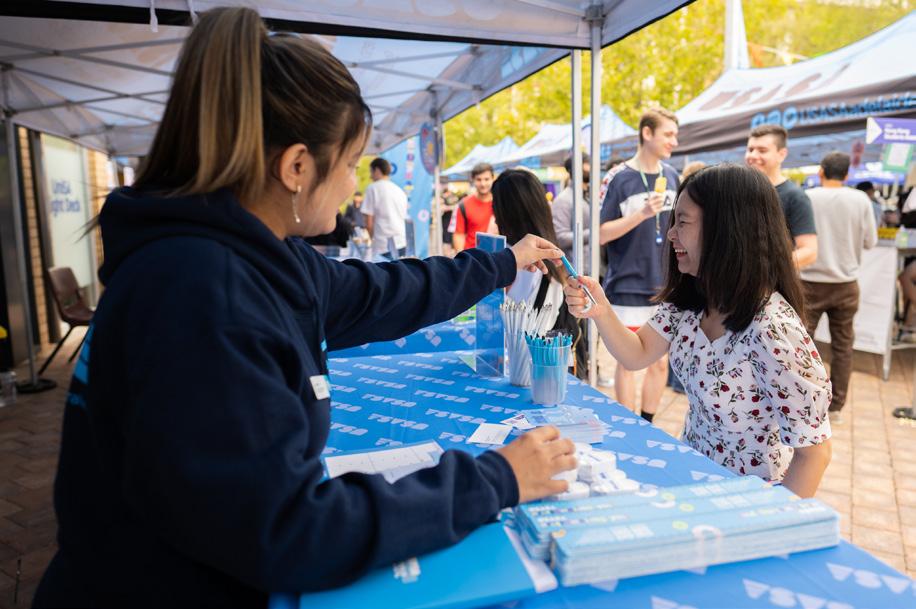

The University of South Australia Student Association (USASA) Inc. is a nonprofit, student-owned organisation that strives to provide a diverse and exciting university experience for the students of UniSA.
The objects of USASA defined in our Constitution are:
a. to promote and defend the interests and welfare of Students at the University and ensure the provision of adequate support services for Students;
b. to promote the growth and development of the Students of the University with particular emphasis on the quality of the teaching and learning environment and the development of academic excellence;
c. to encourage participation in University decision-making, including nominating Students, as required, to serve on appropriate University-wide councils or committees which have provision for Student membership;
d. to promote an awareness of the common interests of Students and to provide a common meeting ground, social centres and such other facilities as may be necessary to secure the further objects of the University of South Australia Student Association;
e. to promote and encourage equity and access at all levels for all Students within the University;
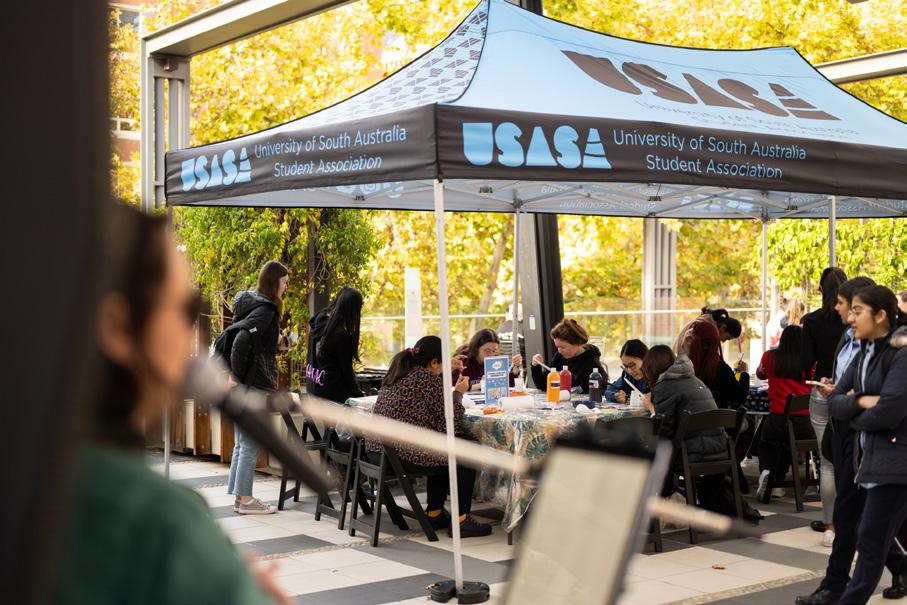
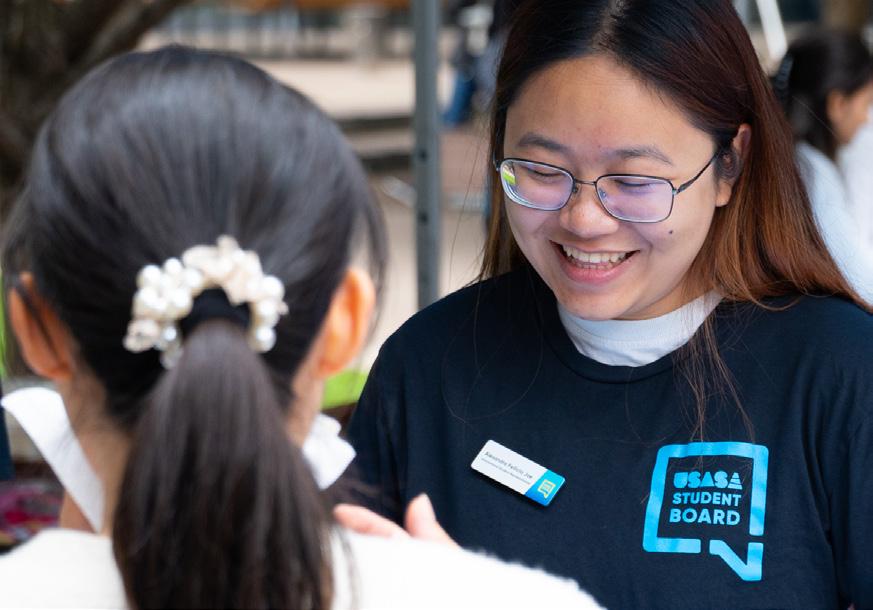
f. to promote diverse Student interests, discussion and action towards relevant issues and to publish or otherwise disseminate information and opinions on matters of interest to Students;
g. to provide, conduct or manage such educational, cultural, recreational, social, sporting or commercial facilities or activities as its Members require and the Board determines are for the benefit of Students;
h. to promote and encourage the implementation of sound environmental practices among Students and staff of the University;
i. to represent all Students for the purposes of the above objects and for the purposes of student representation and advocacy in compliance with the requirements of the National Student Representation Protocols set out in Chapter 3 of the Student Services, Amenities, Representation and Advocacy Guidelines made under Section 238.10 of the Higher Education Support Act 2003 (“Act”) and any amendments to the said protocols and the Act; and
j. to do all things incidental or conducive to the attainment of the objects of the University of South Australia Student Association
USASA provides a suite of programs to support and empower students across all campuses. These programs include professional academic advocacy and financial wellbeing services, supporting student-run clubs and societies, supporting student leadership and involvement in University decision-making, coordinating events and activities, supporting a student magazine, and the provision of retail spaces.
We exist to provide students with the tools, platform, support, and advocacy they need. This gives students agency in creating their own student experience and university journey and ensures that their voices are being heard.
In our commitment to being student led, we acknowledge the value of lived experience and champion the idea of students as partners. Moreover, we take the concept of student led to its zenith by entrusting students with governance of our organisation. The best way to understand and address the needs of our student body is by placing the decision-making power directly in the hands of those most affected.
In essence, our commitment to student led decision-making is not just a value; it’s a lived reality in which students actively shape and contribute to the narrative of their educational journey, fostering a sense of ownership, empowerment, and collective success.
We champion the principles of fairness, inclusion and equal access, recognising that diversity is our strength and that every individual deserves equitable opportunities and resources.
Our dedication goes beyond surface-level pledges; we actively prioritise social justice and human rights, understanding that these principles are not just aspirations but integral components of our identity. We empower students by committing to their self-determination, fostering an environment where each person has the agency to shape their educational journey.
We prioritise the creation of a vibrant, inclusive community that celebrates diversity. We are dedicated to ensuring that every student experiences a true sense of belonging and understands the significance of their presence in our community. We believe that fostering the community spirit not only contributes to students’ academic growth but also cultivates individuals who understand the power of connection, compassion, and collaboration.
At UniSA, community isn’t just a concept; it’s a living, breathing entity that thrives on genuine connections and a shared sense of purpose.
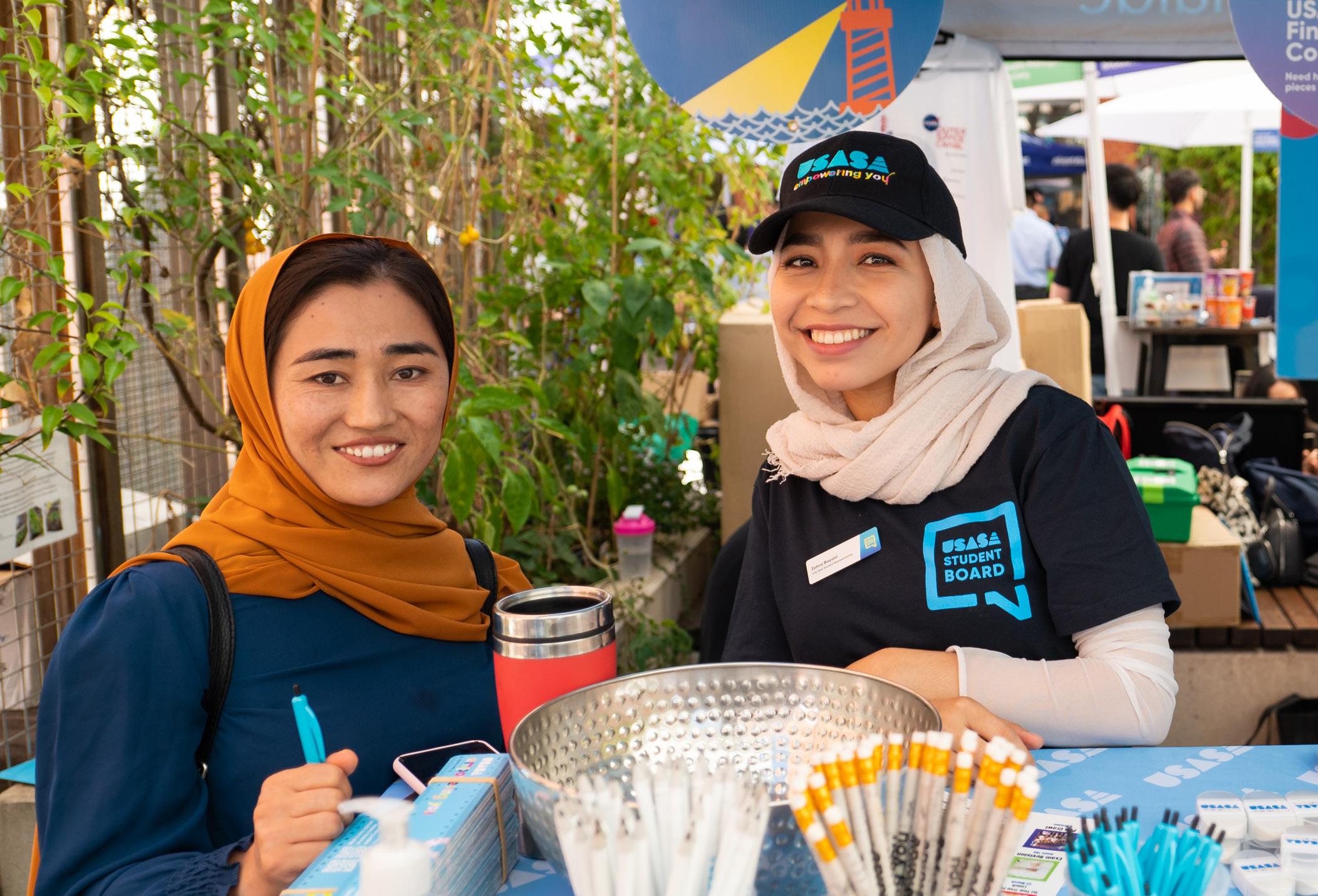
39 1,074 12,000 92,748 1,280 6 3 5 students nominated for Student Board students helped through Academic Advocacy copies of Verse Magazine printed votes during election student interns students on Verse editorial team online click/reads Student Voice delegates
504
102 $52,750 $178,871 7,352 6,154 $2,060 $72,169 Financial Wellbeing appointments clubs supported (76 by end of year) grants provided sales from USASA Shops products sold club members food vouchers given grants given to clubs
151
73
8,000 social events Art on Campus entries diary packs Social Media followers 5,861 13,842
The USASA Board is the peak decision-making committee of the Association, consisting of fifteen Student Representatives elected annually in October.
The Board’s function is to act in student’s best interests and make decisions regarding the delivery of student targeted activities and services. It also has overarching responsibility to manage the conduct of USASA’s business and affairs, including the management and control of funds and property.
The Board consists of the following Officers:
a. President;
b. One Representative for each of Campus of the University situated in Australia;
c. One additional Representative being an Undergraduate Representative for each of the metropolitan Adelaide Campuses;
d. One Postgraduate Student Representative;
e. One International Student Representative;
f. One Aboriginal & Torres Strait Islander Student Representative;
g. One Online Student Representative;
h. General Manager ex officio;
i. Advisers ex officio:
(a) a practising solicitor; and
(b) a practising accountant (chartered or CPA)



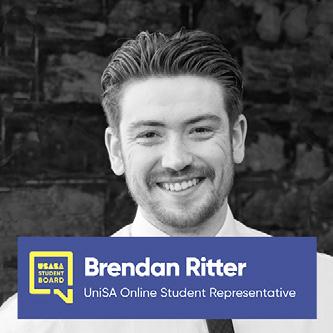


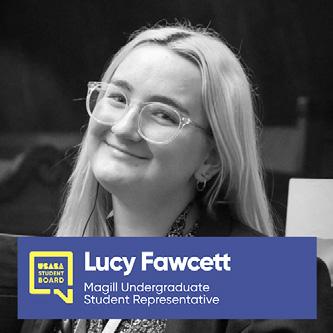
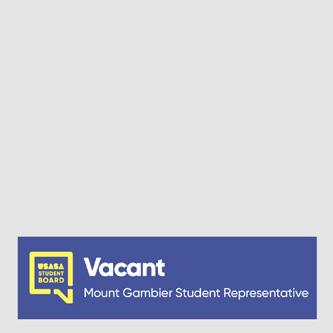
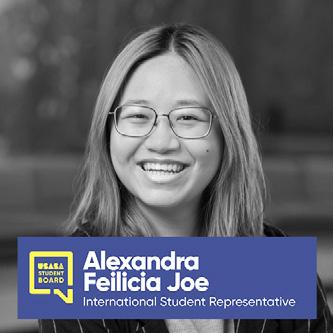



Ex-officio members: Arthur Siow (Legal Advisor), Kaveeta Magandram (Finance Advisor), Daniel Randell (General Manager – until May 2023), Heidi Mander (General Manager – from September 2023)



Members of the USASA Board are involved in a range of University governance processes as prescribed by policy and by invitation. In 2023 these included:
• UniSA Council
• Academic Board
• UniSA Council Governance and Nominations Committee
• Student Appeals Committee
• Formal Inquiries
• Preclusion Appeals
• Student and Academic Policy Advisory Group
• Academic Enterprise Oversight Committee
• Safety and Wellbeing Committee
• UniSA Sexual Assault and Harassment Steering Group (SASH)
• UniSA Student Mental Health Framework Project Steering Group
• Indigenous Student Success Program Governance Group
• National Reconciliation Week Aboriginal Steering Group
• Staff hiring panels
The USASA Board establishes sub-committees to undertake work in key areas of the business, and to make recommendations to the Board in decision-making. The sub-committees established in 2023 were:
• Governance and Risk Management Committee
• Finance Committee
• Education Committee
• Clubs Committee
• Diversity, Equity and Access Committee
• Reconciliation Committee
In addition to formal governance and decision-making processes, the USASA Board raise and respond to issues on behalf of students and actively seek to engage with the wider student body. In 2023 this included:
• Furthering USASA Reconciliation strategy
• Involved in more Reconciliation events
• Launching students’ consultation on RPNow software
• Launching the Student Representation Mapping Out project to identify gaps on student representation at UniSA
• Conducting and reviewing student representation survey
• Presenting to and consulting with UniSA staff on Student Voice
• Conducting surveys to UniSA Online students
• Coordinating activations to connect with students
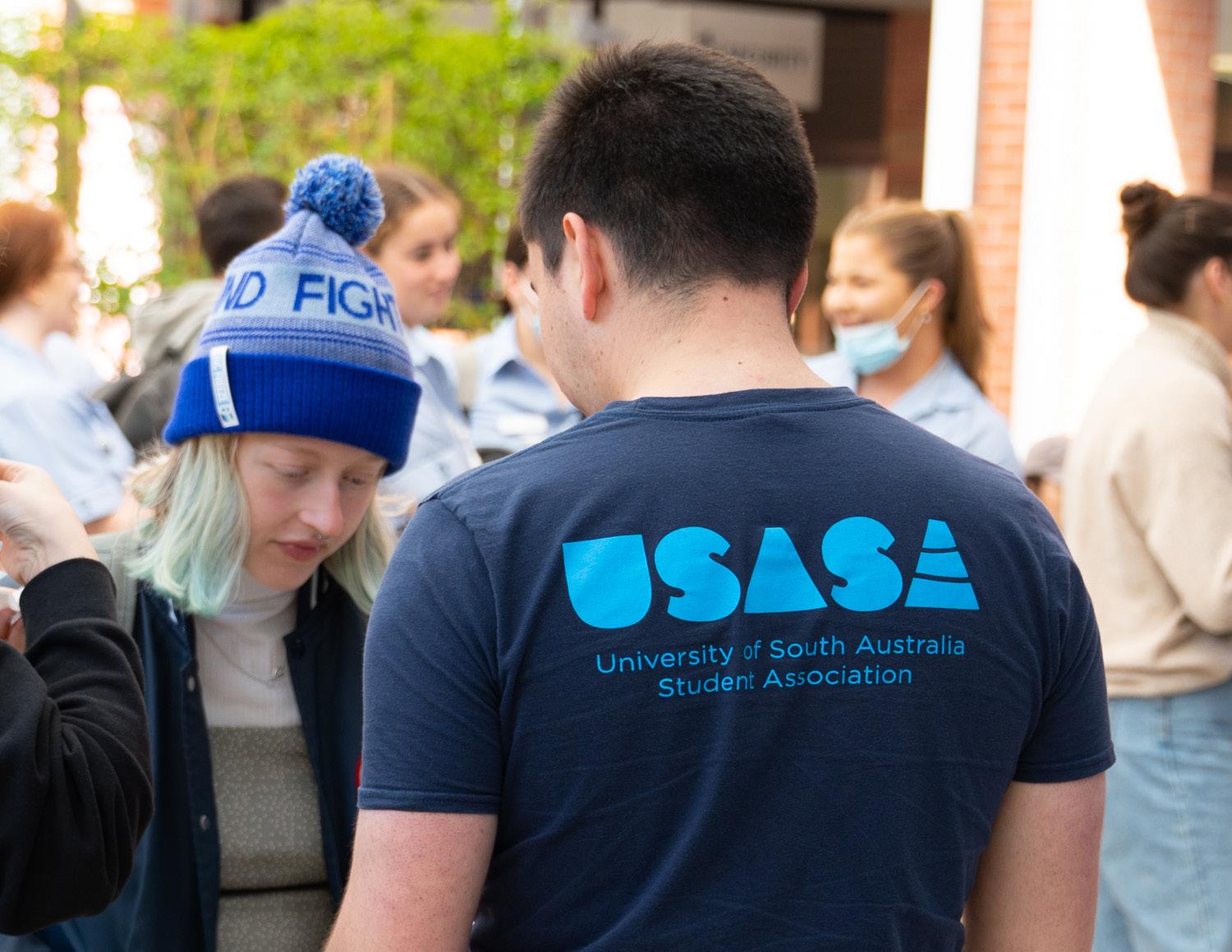
USASA delivers a comprehensive professional development program for all Board Members. This commences in January with the Board Retreat, is closely followed by the Staff/Board Symposium and is supported by a training plan and coaching throughout their terms.
Board Retreat
Held at the Adelaide Hills Convention Centre, in Hahndorf, the Board Retreat is a combination of personal development, team-building and upskilling activities designed to best position each Student Representative for their role on the Board.
Topics of sessions include:
• Introduction to USASA
• Individual strengths, styles and becoming a high performing team
• Mindfulness activities
• Governance operations
• Finance
• Communication protocols and process
• Leadership
• Teambuilding activities
• Board Charter, Code of Conduct, Constitution and expectations
• Formal Inquiries and Academic Review Panel training
• Personal branding
• Conducting Board business
Staff/Board Symposium
The Board symposium is an event designed to complement the Board Retreat with a focus on gaining a greater understanding of both USASA and University programs and services. In 2023, a networking session was also included following the symposium with attendance by USASA and UniSA staff, Board Members, and Club Executives.
Throughout the symposium, presentations were delivered by USASA services staff and key University personnel. Services presented included:
• Board Members Welcome
• USASA Clubs and Societies
• USASA Retails and Student Spaces
• USASA Student Support
• USASA Governance and Student Voice
• USASA Marketing and Events
• UniSA Student Academic Services
• UniSA Facilities Management Unit
• UniSA Portfolio of the Provost and Chief Academic Officer
• UniSA Student Engagement Unit
Held in October annually under rules outlined in the USASA Constitution, the elections provide every student with an opportunity to nominate for various positions. Successful candidates take up their position on the 1st of January of the following year, and can hold office until the 31st of December of that year.
In accordance with the USASA Constitution, the USASA Board passed a motion on 17th of July 2023 to set the timeline for the election and to appoint a Returning Officer. The Board set the timeline as set out below and appointed Debra Arnold to Returning Officer and Cristine Dagnoni to Assistant Returning Officer.
Open: 9 am, 11 September – 4pm, 22 September
Open: 9 am, 16 October – 4pm, 20 October
The results of the election became final at 5pm 27th of October 2023.
At the close of nominations, there were 39 candidates (12 more than in 2021 and 2022) by the time voting opened, this number had dropped to 31 candidates. The attrition was caused by either explicitly withdrawing, nonattendance of compulsory candidate briefing workshops, or being found otherwise ineligible for the positions that they nominated for.
At least one nomination was received for every position, except for Mt Gambier Student Representative. There were 4 uncontested positions in this election, including: Aboriginal and Torres Strait Islander Student Rep, City East Undergraduate Student Rep, UniSA Online Student Rep, and Whyalla Student Rep. These positions did not go to a poll. The uncontested City East Undergraduate Student Rep candidate was also the sole nominee for City East Student Rep, leaving the City East Rep position vacant.
The election was conducted using the built-in election module on the USASA website. This platform allows secure secret ballot voting, with communications sent directly to all eligible voters.
At the close of voting, 4% of eligible votes had been cast, which is 1280 out of 32,000 eligible voters. By comparison, 2.07% voted in 2022 which was 768 out of 37,000. The doubling of voter turn-out was a welcome outcome, and not unexpected due to the impacts of post-covid burnout and uncontested positions in 2022 that were in line with nation-wide trends.
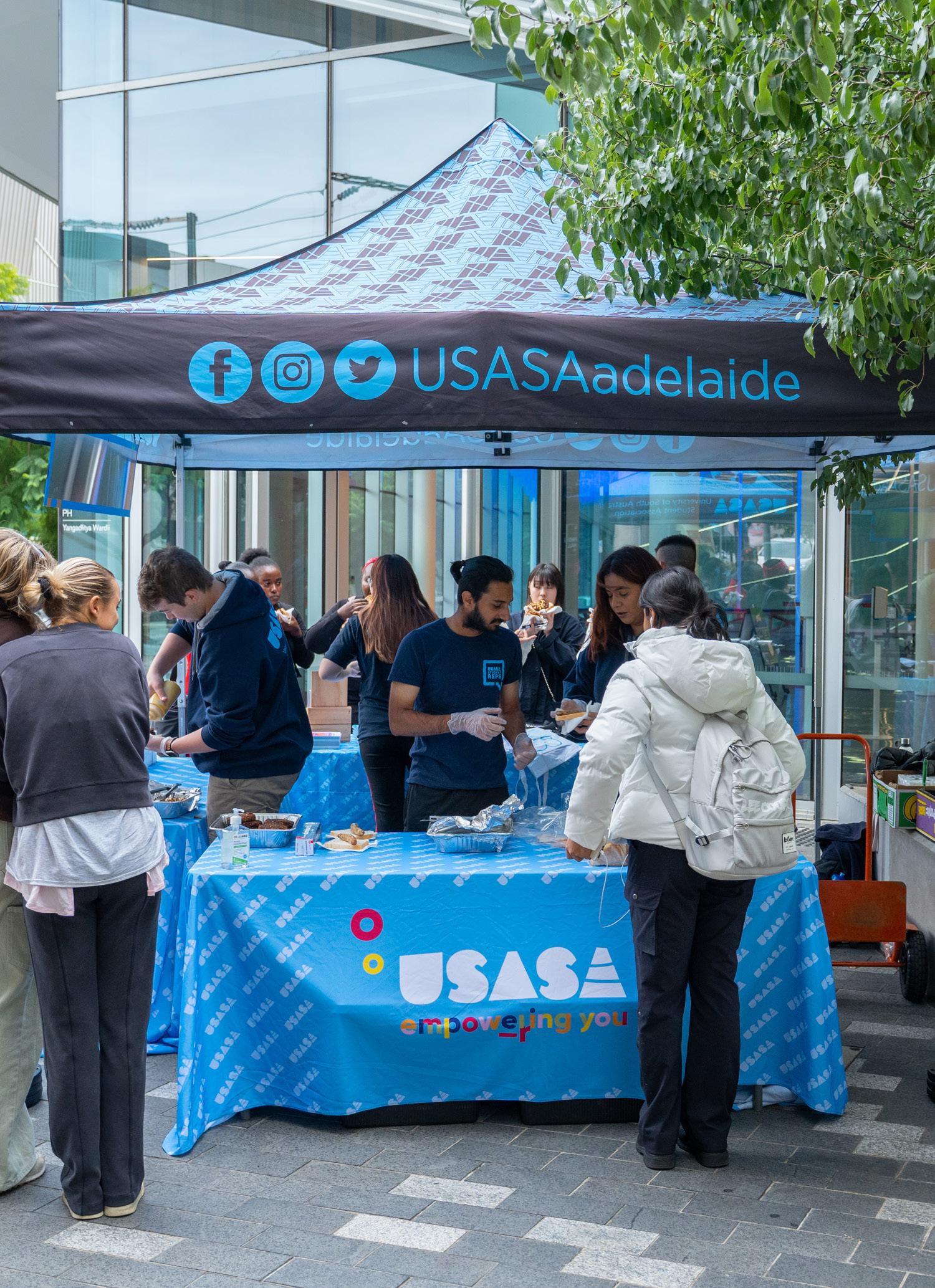
Commenced in 2022, Student Voice aims to support student representation in every level of University’s decision-making. Under Student Voice, students partner with university staff to create a better university environment for students.
Student Voice has been proactively gaining staff awareness and partners to include student representatives to be part of their decision-making. This includes advocating for the best-practice of governance that eliminates power inbalance between student and staff to achieve real student voice. Student Voice also promotes growth and development for students especially in leadership, problem-solving and communication skills.
Provided presentations to various Academic and Professional staff
• All Academic Units of UniSA
• Academic Board
• Teaching and Learning Groups
Delivered Student Voice resources
• 12 physical copies via internal mail
• 11 copies via campaign rollout and promotion
• 3 copies via Student Voice training
Supported student representative recruitments from university working groups and committees
• Information Strategy and Technology Services (ISTS)
• Student Engagement Unit (SEU)
• UniSA Creative Academic Unit (CTV)
Recruited Student Voice Delegates for Formal Inquiry panels
• Number of SV Delegates in 2023: 5
• New recruited SV Delegates in 2023: 2
Provided training to student representatives
Supported in the production of Student Voice video campaign that featured important stakeholders including
• Prof. David Lloyd: UniSA Vice Chancellor and President
• Prof. Joanne Cys: Provost & Chief Academic Officer
• Prof. Esther May: Pro Vice Chancellor: Teaching & Learning
• Asso Prof. Jodie George: Academic Director: UniSA Online
• Dr Fiona O’Neill: Program Director: Bachelor of Arts
• Leanne Steele: Program Manager: MBA
• Isaac Solomon: USASA President 2022-2023
• Riya Bhaizada: Postgraduate Student Representative 2023
• Brendan Ritter: UniSA Online Student Representative 2023
• Chanchal Yadav: USASA Student Voice Delegate
• Iona Mackenzie: USASA Intern, Student Representative, Bachelor of Arts
Consulted staff members who engaged with student representatives
Supported the Student Representation Mapping Out project
Partnered with UniSA Student Engagement Unit on extending support to student representatives
Promoted the benefits and opportunities of Student Voice to students through events
Launched Student Voice newsletter service to announce latest SV opportunities
• Stronger connection between USASA and the University
• Enhanced student representation in various aspects of University’s decision-making
• Breaking through the power imbalance between students and staff
• Supporting students’ development in their personal and professional growth
Future plans (2024)
• Create a standardised system of support for UniSA staff and students
• Increase the awareness of Student Voice among UniSA staff and students by enhancing communication protocols
• Continue the Student Representation Mapping Out Project to identify possible gaps in University Governance and increase the student representatives’ satisfaction
• Creating more opportunities for student representation through increased staff partnerships
• Provide governance and leadership training and ongoing support for all student representatives
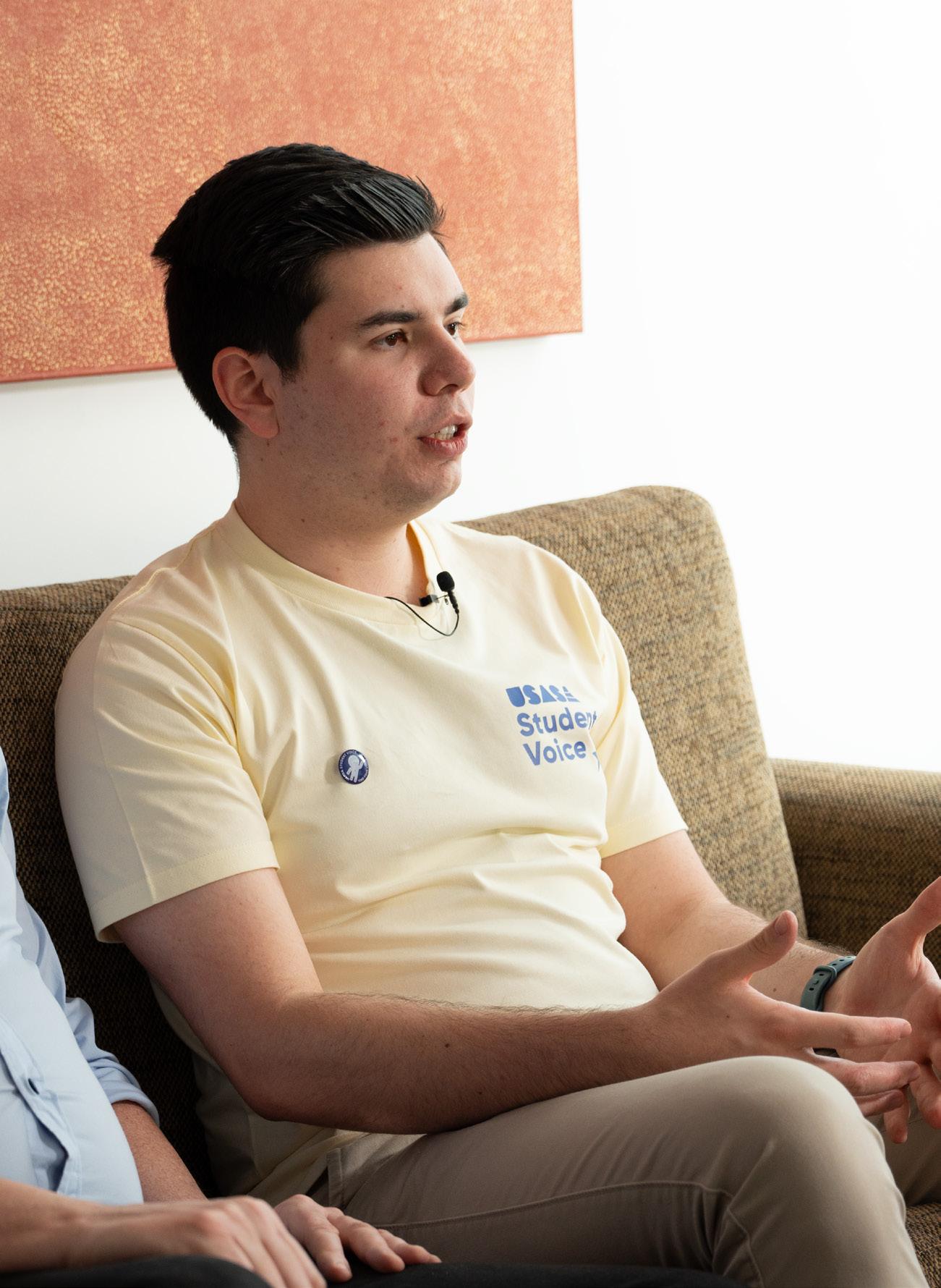
The Advocacy Officers of USASA are responsible for providing UniSA students with a wide range of information, advice and services to manage processes relating to their academic performance and progress. USASA Advocacy Officers are experts on the APP (Assessment Policies and Procedures) and are trained in case management and mediation.
Total new student cases: 1074
* Some students may have two different cases. E.G. Preclusion and/or Amendment to Enrolment. * This data was collected from our previous
USASA involvement in University policy/process review
Manager Student Support and Retention Luis Gardeazabal:
• Attended all SAPAG meetings & reviewed APP policies – A student representative is also part of the group.
• Was part of the Student Success (Retention for belonging) working group.
• Was part of the SASH Steering Group.
• Was part of the new Student Hardship Found Steering Group
Advocacy Service Survey
• 98% of Students rated ‘Excellent’ the communications response time from the Advocacy Officers from USASA
• 97% of Students rated ‘Excellent’ or ‘Very Good’ to how clear was the advice of your options and possible outcomes including the clarification of university policies and procedures given by the Advocacy Officers from USASA
• 96% of Students rated ‘Excellent’ or ‘Very Good’ the general advice and help provided by the Advocacy Officers from USASA
“The Advocate that helped me with my case was amazing, the advice regarding how to proceed with the case was really great.”
“The support I received from my Advocacy Officer was exceptional. He went above and beyond to make me feel relaxed and comfortable with expert advice. I couldn’t have asked for a better advocate.”
“Thank you so much for your help with sorting this whole Academic Integrity issue for me to get the best possible outcome. I don’t think I would have been able to survive through whole situation by myself and certainly would just have failed the exam I will surely recommend USASA to all my mates who deal with the similar issue.”
The Academic Advocacy Internship Program is a 14-week course that teaches students about UniSA’s Assessment Policies and Procedures while helping them develop personal and professional skills. The program involves exploring a key policy area each week, with various tasks aimed at enhancing skills through weekly worksheets and workshops. In 2023, the advocacy team conducted two rounds of internships with six interns in total. During the internship, interns sat in on advocacy appointments and learned about real-life student cases. The experience helped interns develop interpersonal and professional skills, including interviewing, client servicing, case noting, and debriefing. Interns also co-hosted client meetings and took on a small caseload supervised by Advocacy Officers.
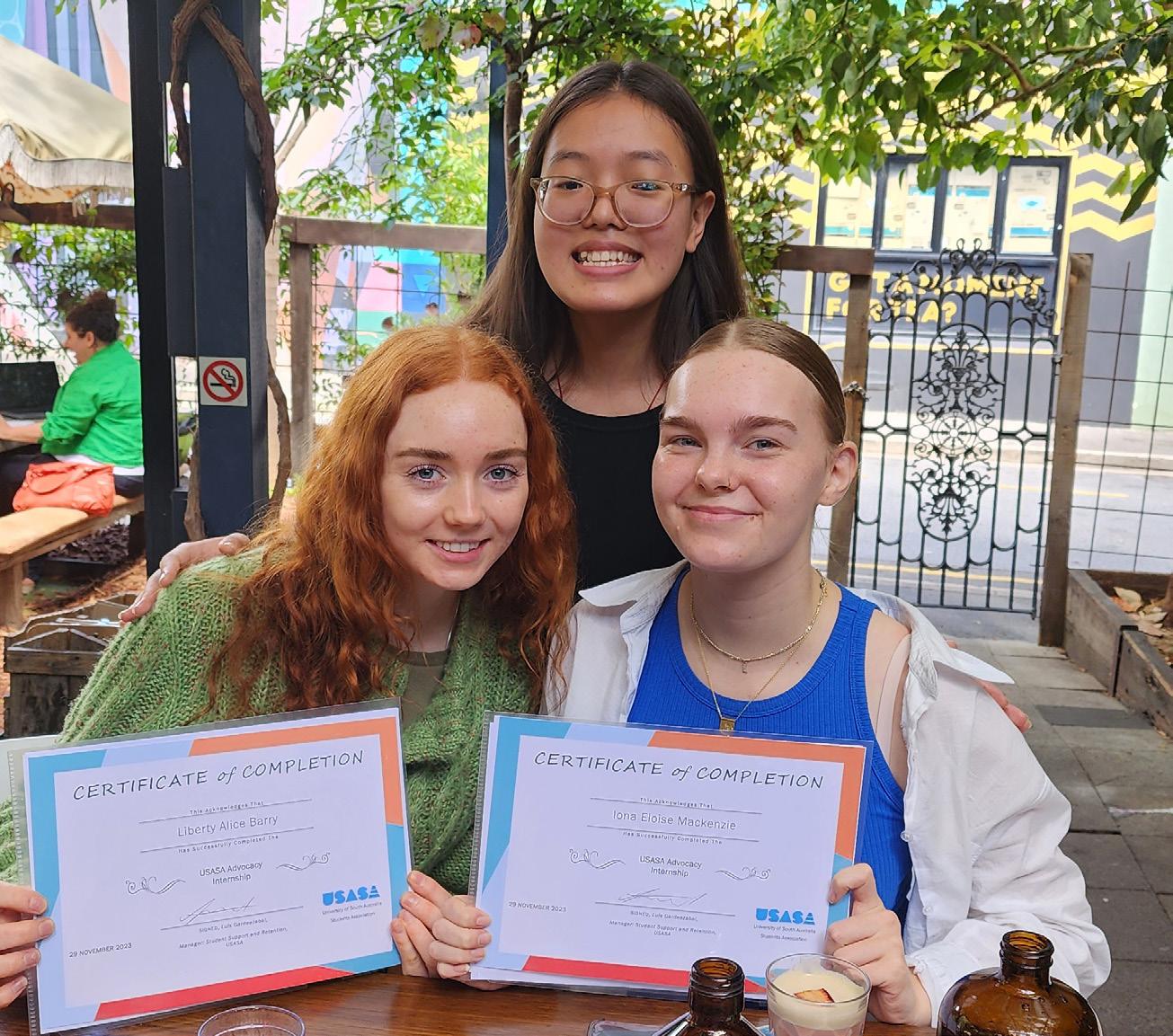
The USASA Financial Wellbeing service has been supporting students in great need since 2019. The Financial Wellbeing Support Officer provides support and assistance to students in areas including:
• Developing a budget to understand better their current financial situation
• Addressing cases of bad financial standing with the University and assisting with the preparation of a payment agreement plan
• Accessing emergency food support
• Providing direction to access further financial support and assistance from community stakeholders. USASA has established relationships with Foodbank to provide referrals for students with emergency needs. Students are able to access vouchers for the purchasing of food items from Foodbank distribution centres with the cost being covered by USASA.
We continue to support the University Emergency Hardship Fund referring students as per the system created by UniSA.
We dramatically increased the awareness of the service and we created the Financial Wellbeing Booklet.
The four main key issues that we perceived during 2023 are:
• Increased cost of living and decreased disposable income were two of the primary reasons why domestic students sought FW services.
• Domestic students face a range of difficulties that go beyond financial problems. Often, their financial struggles are a result of other underlying issues such as suicide, gender identity, domestic violence, substance abuse, and mental disorders. These challenges are what lead them to seek financial support from us.
• International students, on the other hand, are mainly in need of our services due to increased tuition fees and worse economic conditions in their home countries.
• When it comes to international students, food, scams, car accidents, employment, and debt-related issues are among the primary reasons they seek our assistance.
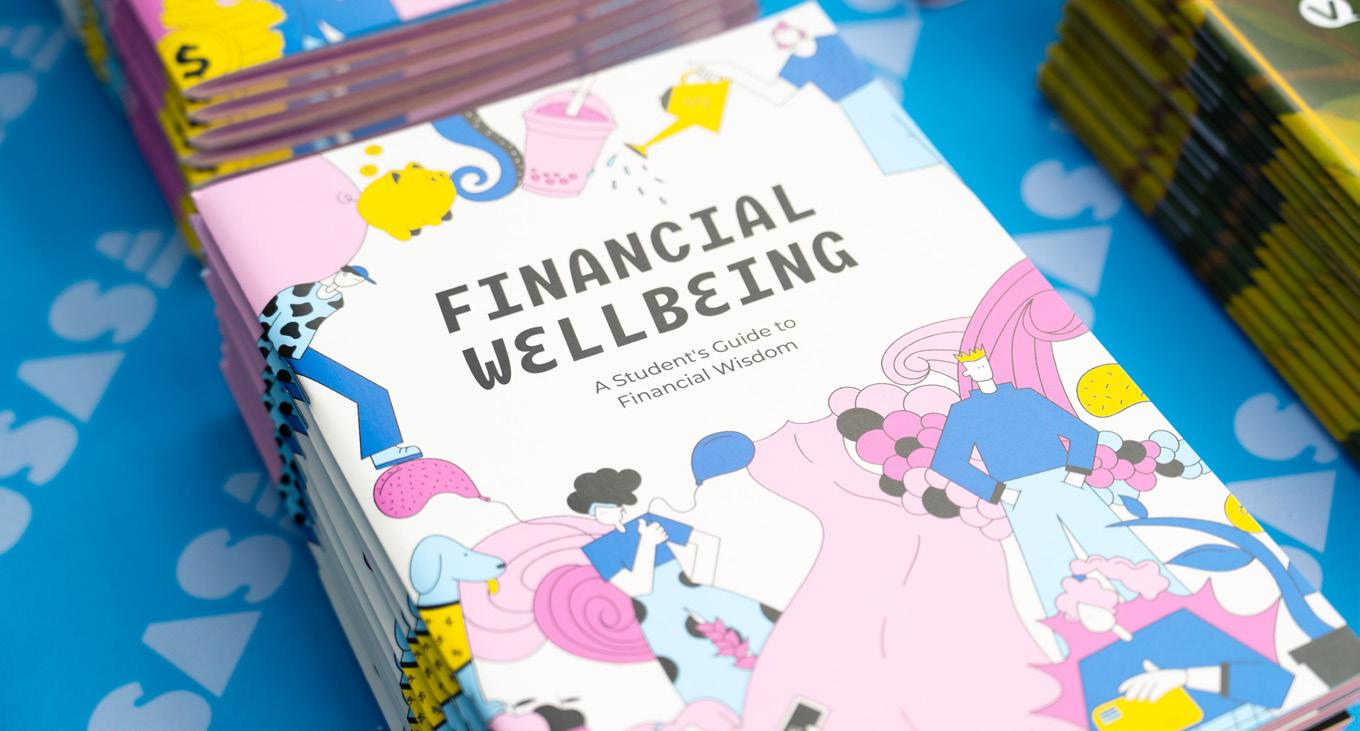
The USASA Clubs & Societies program allows academic, cultural, social justice and special interest student-led groups to establish and meet the needs and wants of students, as directed by themselves.
USASA provides resources, training, promotional opportunities, funding, and dedicated support staff. This platform helps students plan and host events, foster social connections, create spaces, and contribute to a vibrant student community. Additionally, it helps students develop lifelong connections and leadership skills. Active clubs throughout 2023 Events and activities hosted by clubs Club memberships (Highest end-of-year result) 102
The program has had a significant impact on encouraging individuals to take on leadership roles, as evidenced by the notable rise in engagement with various clubs. This trend highlights the program’s effectiveness in providing a platform for active participation in leadership and fostering a culture of community involvement.
Achievements:
In 2023, USASA had a total of 102 clubs active over the course of the year, and these clubs hosted a combined total of 504 events and activities. Clubs attracted a total of 6,154 memberships in 2023, which represents the highest ever end-of-year result for USASA clubs.
USASA hosted two social events for club leaders, as well as the annual USASA Club Awards Night to ensure that club leaders are rewarded and recognised for their contribution to the UniSA student community.
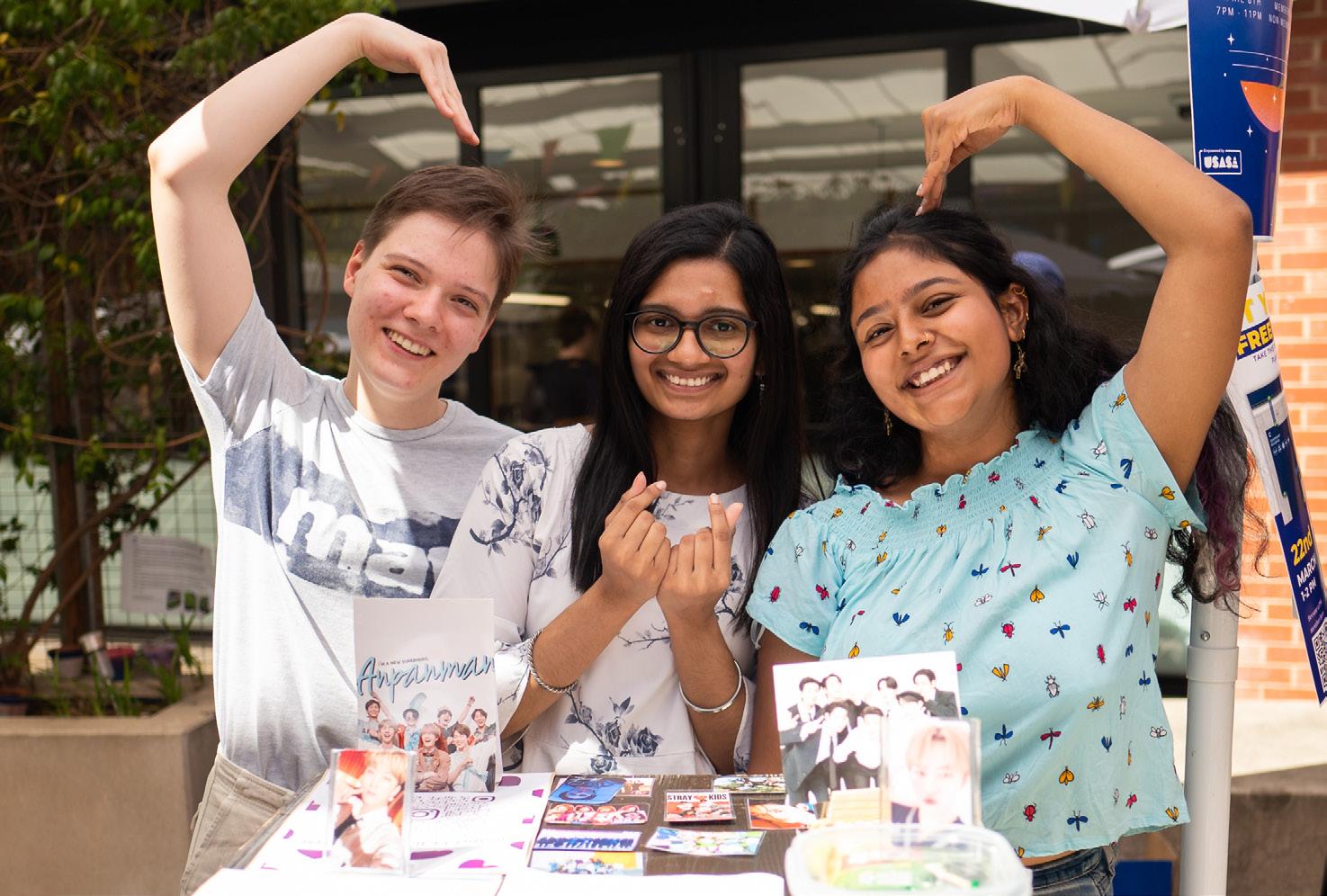


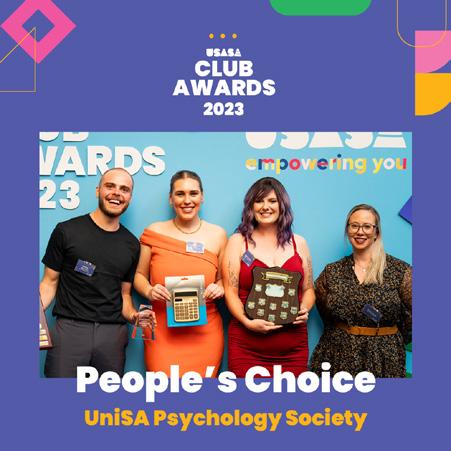
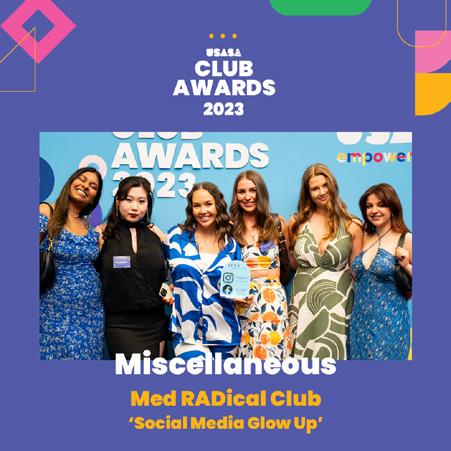


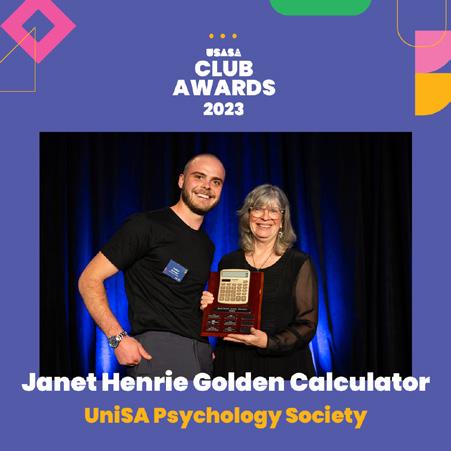
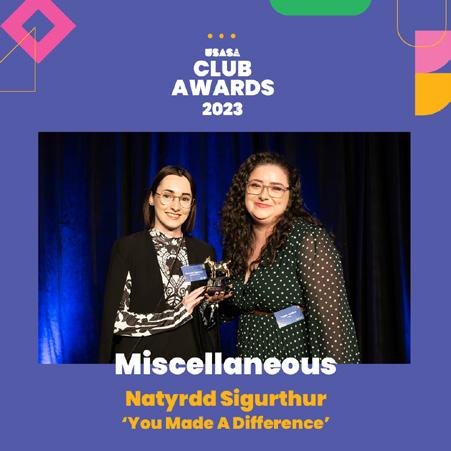
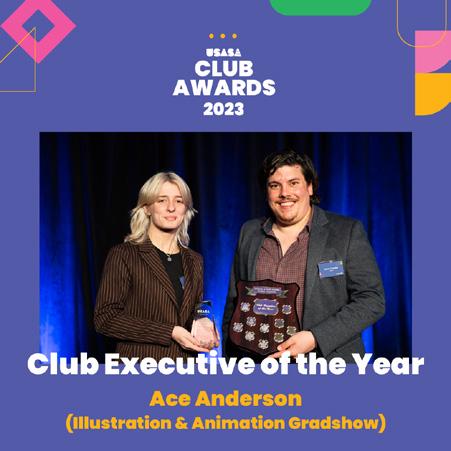

In 2023, USASA received 112 grant applications from 51 clubs requesting $104,359. $72,169 was distributed across 91 successful applications.
• Assisting 26 clubs participate in Campus Fair and Orientation events.
• 7 career development programs/activities
• 35 social initiatives
• 10 marketing and promotional initiatives
• 8 cultural events
• 5 graduate exhibitions
Given that the allocated grant funding was exhausted, there is scope to expand the program so that a greater number of student-led initiatives can be supported through the program and continuing to improve the student experience at UniSA.
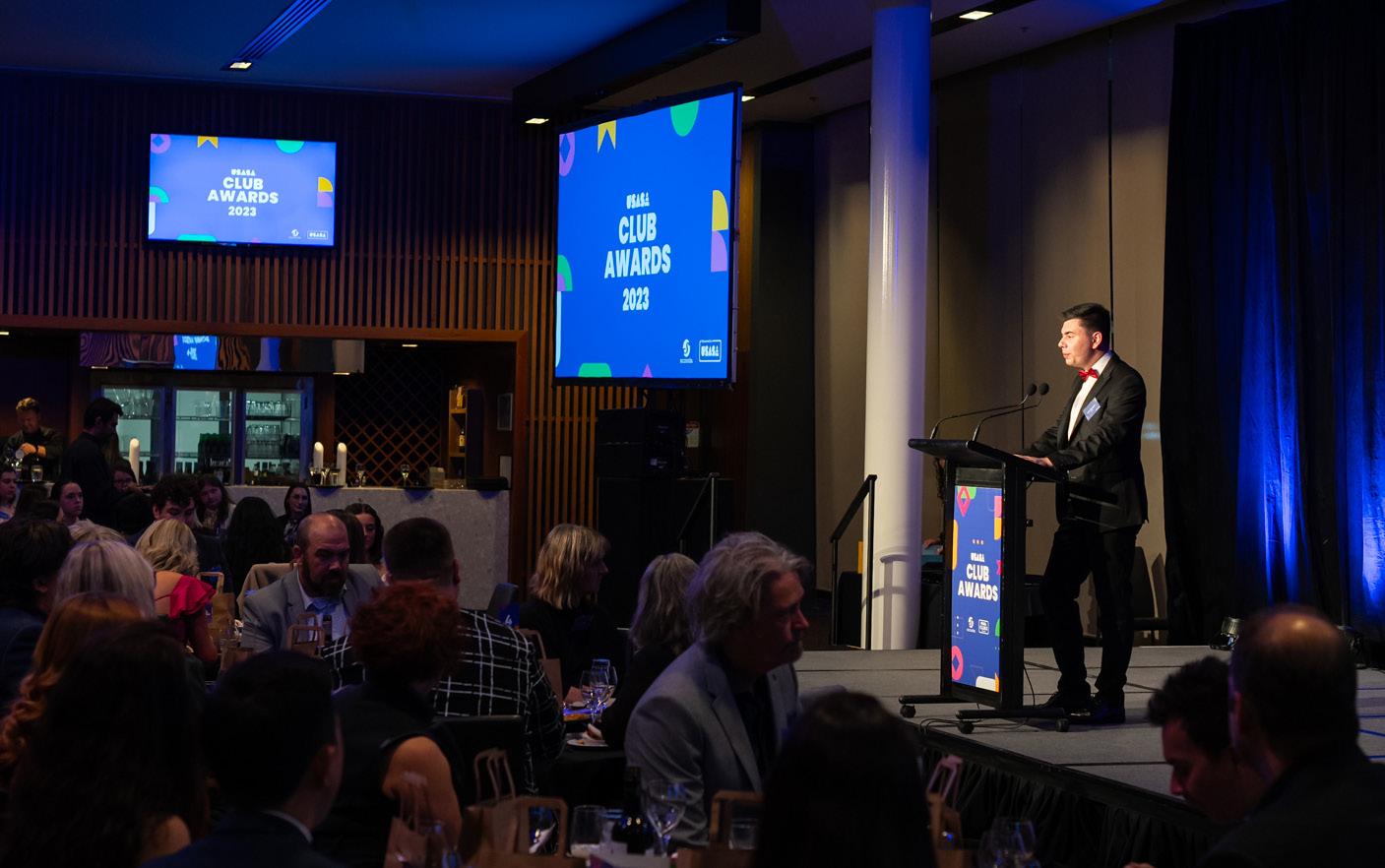
USASA holds a range of events every year to support new students in adapting to university life, creating communities, and promoting student wellbeing. All events, both on and off-campus, are planned and executed with the help of students. As the number of students returning to physical campuses increases, the focus of the events program has shifted towards fostering social connections while continuing to support online engagement activities. In 2023, USASA hired a Volunteer Coordinator which allowed for a significant expansion of volunteer opportunities.
Each of USASA’s events strives to meet one or all of these objectives:
• Enhance the welcoming experience for students at UniSA, facilitating a smooth transition into university life.
• Elevate student awareness regarding the breadth of programs and services offered by USASA.
• Foster meaningful connections among students, helping them build a supportive peer network.
• Bridge the gap between students and the plethora of services and extracurricular opportunities accessible to them.
• Motivate students to prioritise their health and wellbeing through targeted initiatives.
15,974
Students attended USASA events
76 8,000 1,229
• Integrate cultural respect and education seamlessly into every event, promoting a diverse and inclusive environment.
• Expand volunteer opportunities and experiences available at each event, enriching student engagement and skill development.
Student volunteers participated in events
Diary bags distributed Promo t-shirts given out

Orientation SP2
~ 5,200 Orientation bags across spaces & pop-ups + 1000 t-shirts across the week
Networking Event 35 students
Board Retreat 14 students Symposium 14 students
Campus Fair SP2 ~ 2000 students across 4 events
Clubs Welcome 50 students

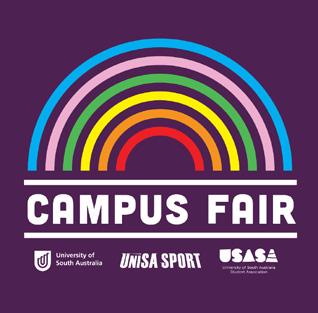
Orientation SP5
~ 500 Orientation bags across spaces & pop-ups + 249 t-shirts
Working On Wellness ~ 2000 students across all events/activations
Pride Fair (with SEU) 92 tickets sold
USASA Pop-Ups
4 events across Mar, May & Aug ~ 1800 total students
Outer Space
Pub Crawl 516 tickets sold
Clubs Social 35 students
Volunteer Expo
Meet Your Candidates ~ 30 students
Election Events ~ 30 students
Aboriginal Website Launch Event 20 staff/students
Campus Fair SP5 (City West only) ~ 700 students Wellness Market ~ 700 students
Speed Friending 100 students
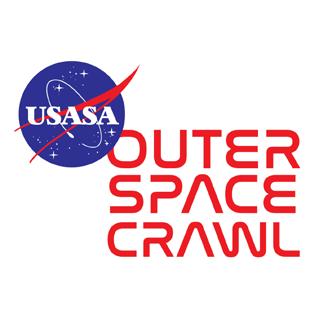


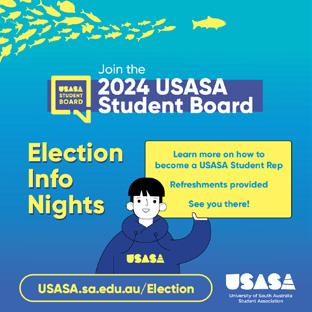
Club Awards 133 tickets sold


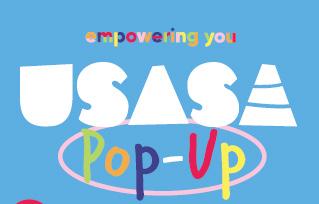
Verse Magazine is a publication created by UniSA students for UniSA students. It is distributed in print and online, providing a platform for the UniSA community to connect through its content and engage in conversation. The magazine also serves as a showcase for students' work and a means to develop their skills. The editorial team comprises students and includes a Head Editor, Editor, Comms & Digital Editor, and Graphic Designer.
The 2023 Verse Student Team consisted of:
• Tamara Montina – Editor
• Taybah Hamza – Comms & Digital Editor
• Lucia Rojas – Graphic Designer
Verse Magazine received over 260 student contributions from 114 students in 2023, with 12,000 printed copies distributed across six editions. For each edition, submission callouts go to all disciplines and campuses to collect perspectives for the magazine. A combination of new and repeat contributors create an ever-changing mix of opinions representing all UniSA campuses.
Verse showcases the work of 20-40 students from UniSA in every edition. It includes an extensive collection of poems, art, travel stories, music reviews, opinion pieces, and more. Additionally, the magazine has regular segments such as art activities, student voices, playlists, feature artists, graduate interviews, and social pages.
Verse Magazine is a significant platform at the University of South Australia because of the university’s large art, architecture, and design programs, celebrated journalism schools, and multi-campus formats. The magazine is influential for students in these creative fields to gain industry experience and plays a vital role in connecting students across metropolitan and rural campuses. Verse aims to reflect all students passionate about art, design, and writing.
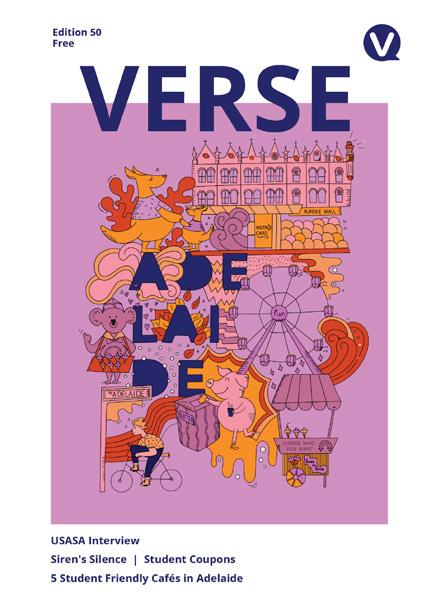




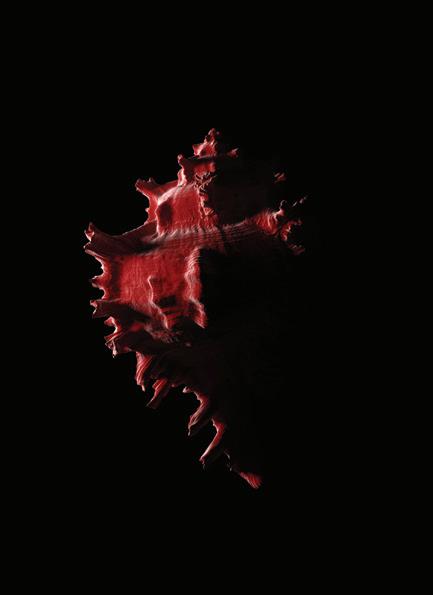





In 2023, USASA transformed its Student Spaces into dynamic USASA Shops, shifting from mere customer service desks to vibrant retail outlets. These shops now offer everything from essential UniSA uniforms to high-quality branded merchandise, catering to the diverse needs of UniSA students. This evolution marks a significant leap, turning these spaces into bustling hubs where students not only shop for UniSA gear but also find a sense of community and pride in their university.
In 2023, USASA Shops raised net sales of $232,638, which is almost double the net sales of $118,506 made in 2022. Commissions of approximately $10,460 were paid to the university. USASA Shops have grown from 4 small USASA Spaces rooms to 4 USASA Retail Shops, which are far more accessible and visible to students. 1889 uniform and safety items were supplied to students, and 4257 UniSA branded jumpers, t-shirts, accessories, and stationery items were sold. Polo shirts and soft shell vests were supplied to students at a lower cost than the other suppliers of these items.
$232,638 $10,460
Net sales - almost double net sales in 2022 ($118,506) Commissions paid to University 1,889 4,257
Uniforms & safety items sold

UniSA branded jumpers, t-shirts & accessories sold
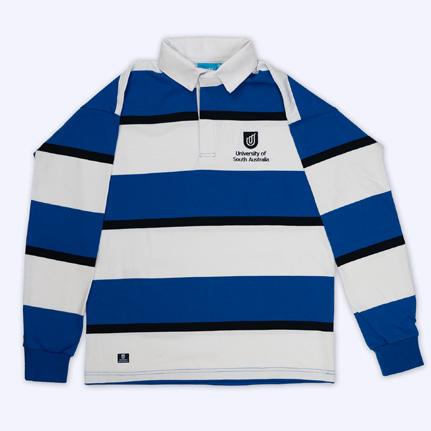

The funds raised by USASA Shops have a flow-on effect through the events and services supplied by USASA to students. USASA Shops have enriched the university experience of students by giving them a place on campus where they can buy what they need for their course requirements while finding out more about university life and services available. Regional and online students have the same access as on-campus students to products via the online shop, reducing the feeling of isolation, fostering engagement, and keeping them connected to the wider learning community.
USASA Shops plan to move to Shopify POS and the Shopify online shop platform in 2024, making online shopping easier. The product range has been reworked to give students more choice, catering to different preferences while addressing affordability. USASA will begin selling nursing shirts on campus through their shops to nursing and midwifery students in February 2024, making them more accessible and affordable. The first USASA Op Shop will be trialed at the City West site from the last week of April, aimed at giving students access to affordable, sustainable clothing and homewares options. Graduating students will have access to the shop to get their last pieces of memorabilia via a pop-up stall close to the ceremony and other suppliers.
USASA plays a pivotal role in ensuring that students are well-informed and engaged with the numerous services, events, activities, and programs available to them. Utilising a mix of physical and digital platforms, USASA has been steadfast in its mission to maintain a strong connection with students and to continue offering services in both traditional and online formats.
In 2023, USASA focused on enhancing its digital presence through various platforms, with notable achievements in website engagement and social media growth. The USASA website, serving as the central hub for information dissemination, recorded a remarkable 36.1% increase in pageviews from the previous year, reaching 661,000. This surge in engagement can be attributed to the introduction of new shop products and services, which attracted a larger audience.
Social media platforms also saw significant growth. On Instagram, the follower count rose by 7.84%, marking a consistent upward trend in audience engagement. Facebook's performance was also noteworthy, with page likes increasing by 1.93% from 2022, indicating a steady growth in the platform's reach. Moreover, USASA's initiative to expand its online presence included the launch of a TikTok account, further diversifying its social media strategy.
The USASA FYI e-newsletter remained a crucial component of the association's communication efforts, reaching over 96,000 subscribers in 2023. The subscriber list saw a 46% increase from 2022, demonstrating the newsletter's growing relevance and effectiveness in keeping students informed.
The significant growth in both website engagement and social media following has underscored USASA's commitment to providing accessible and engaging online services. The increased digital footprint has not only improved the visibility of USASA's services and programs but has also fostered a stronger sense of community among UniSA students. The ability to reach a wider audience through diversified communication channels has enhanced the overall student experience, providing more accessible information and support.
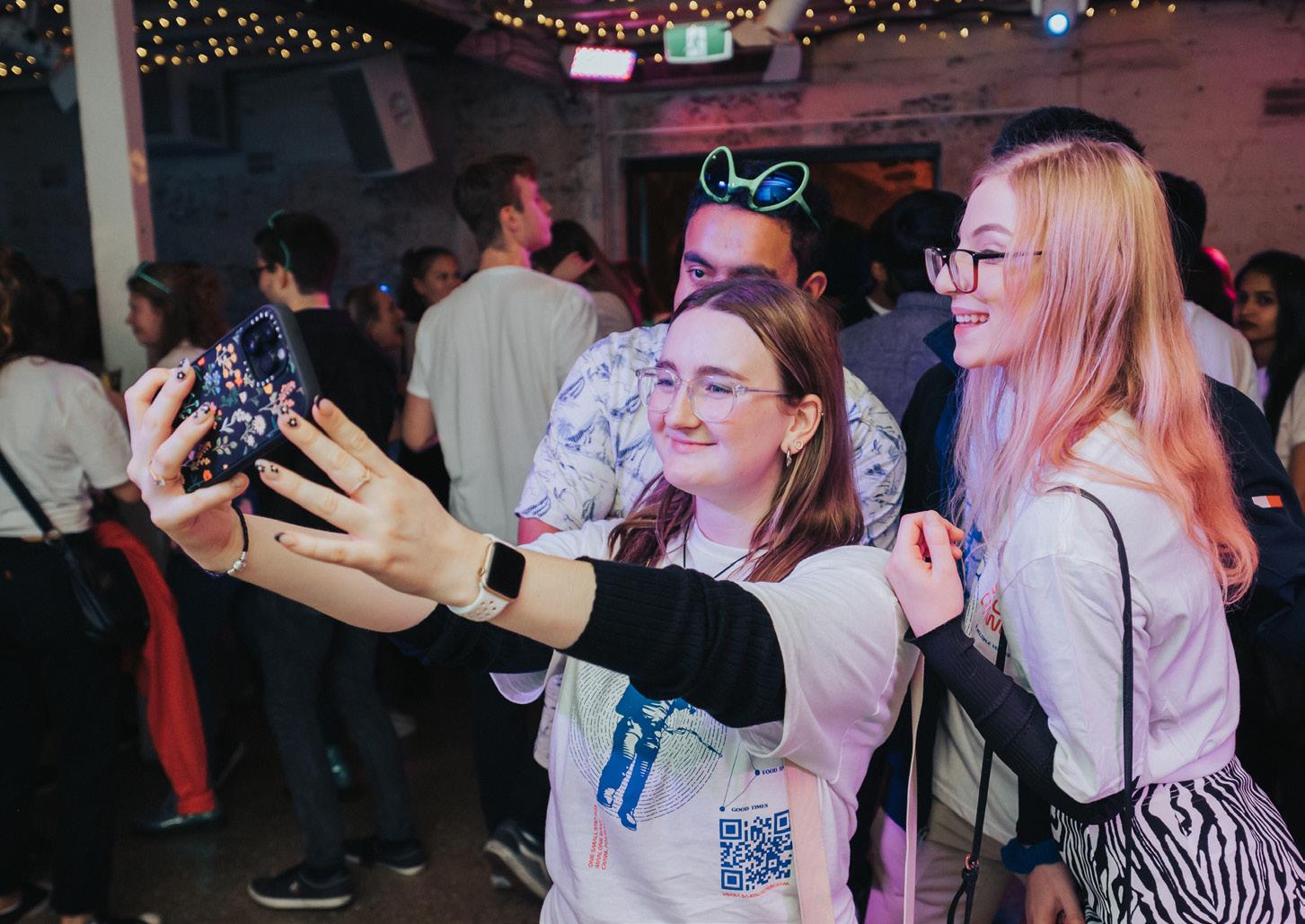
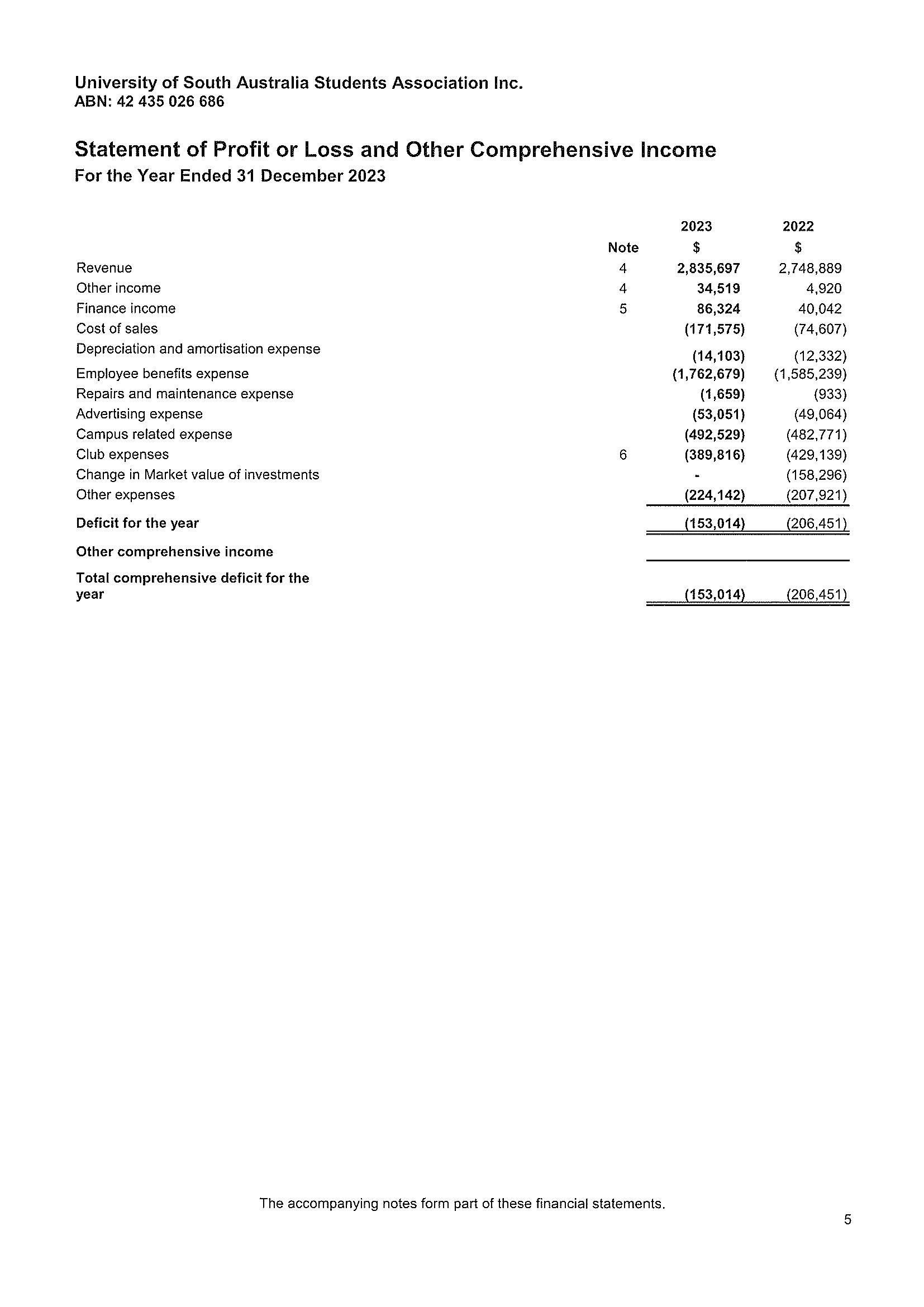
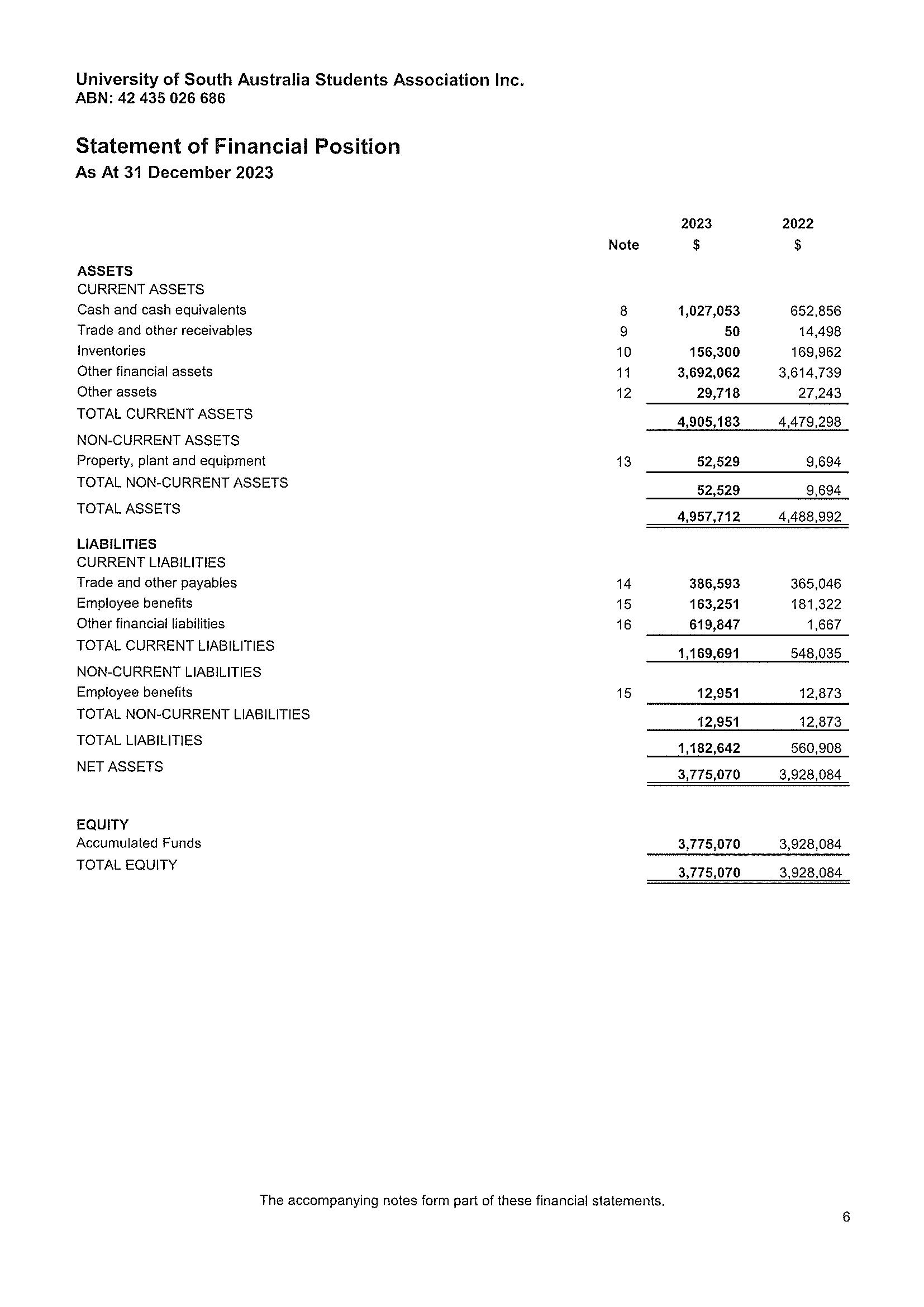
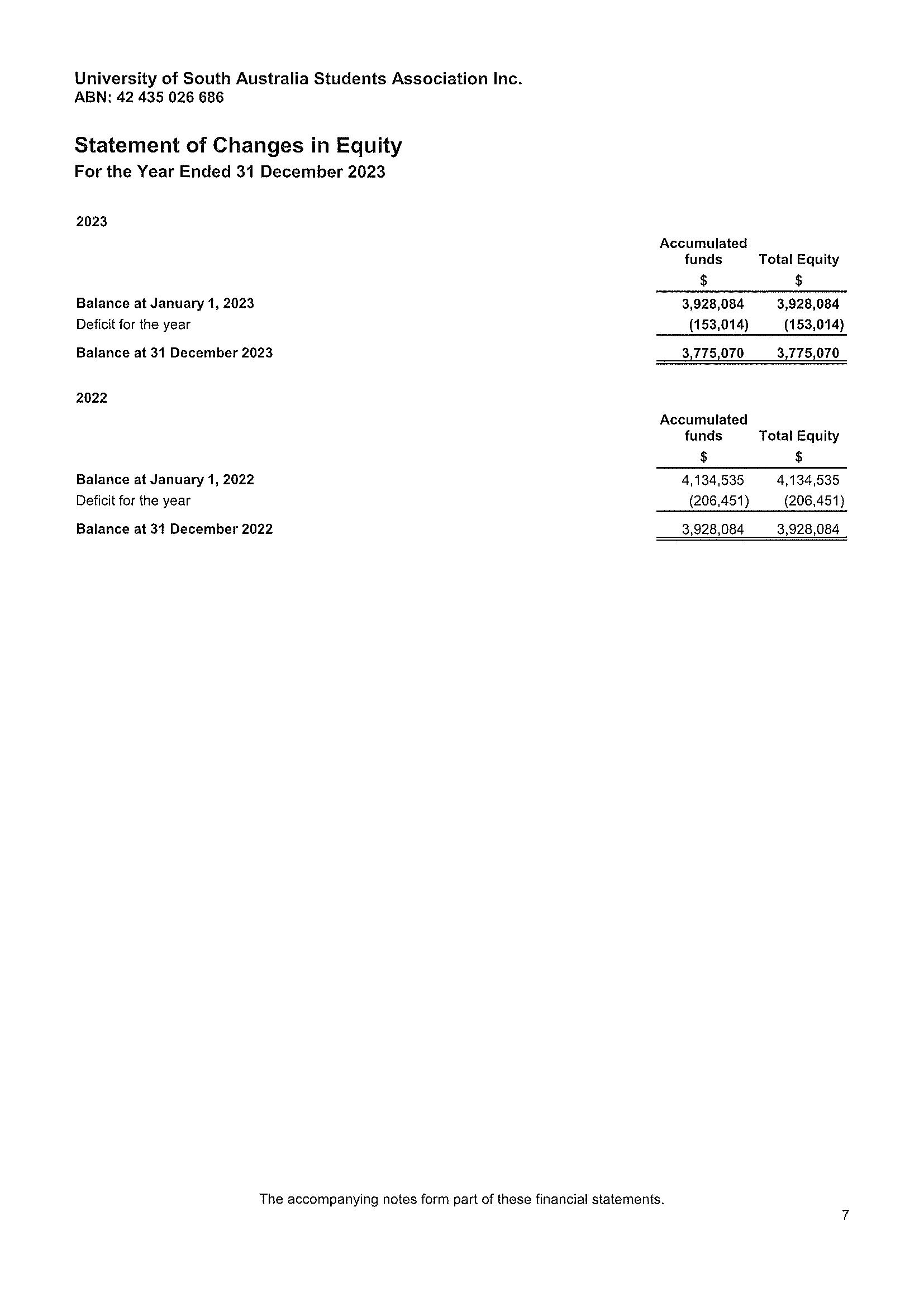
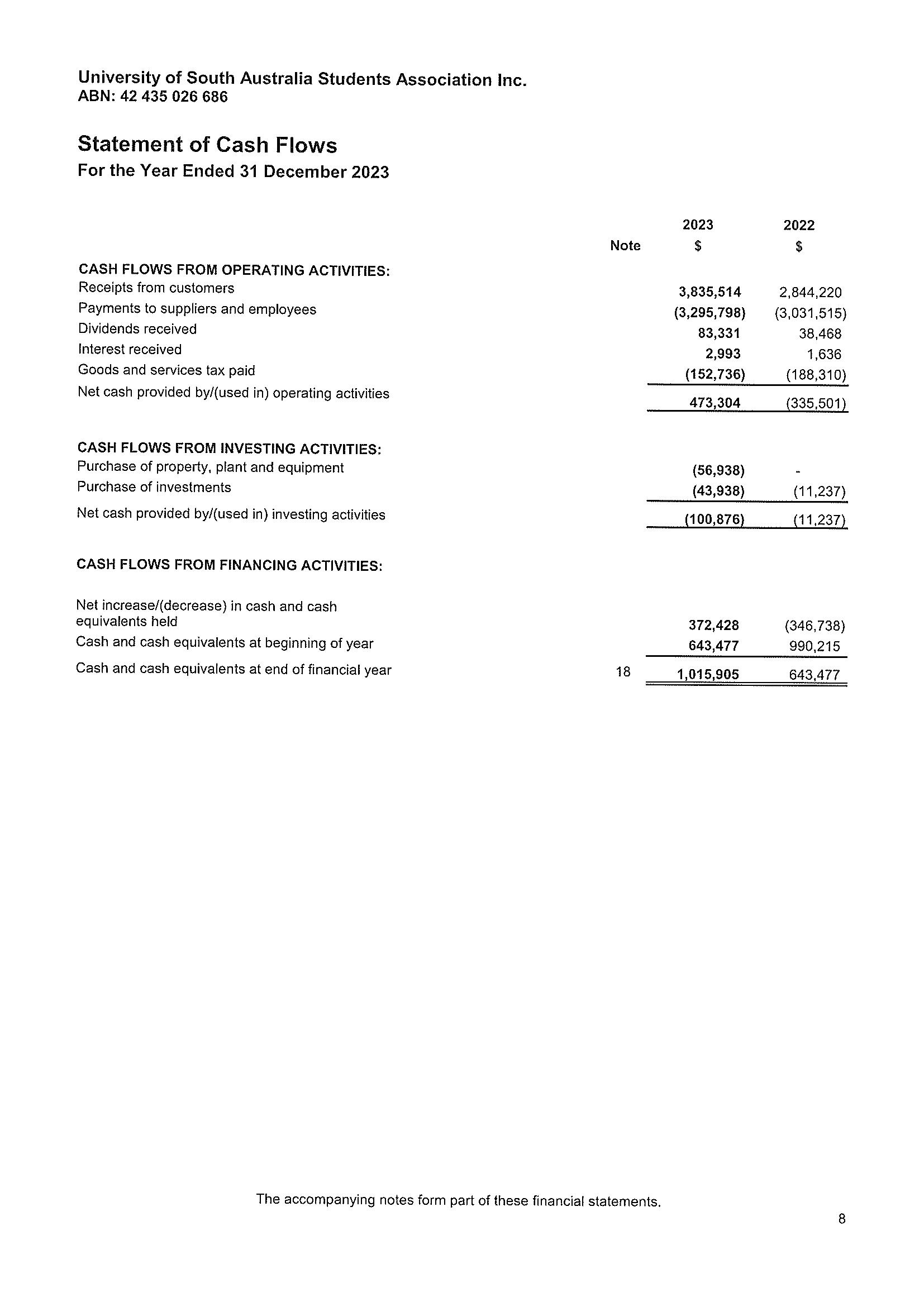
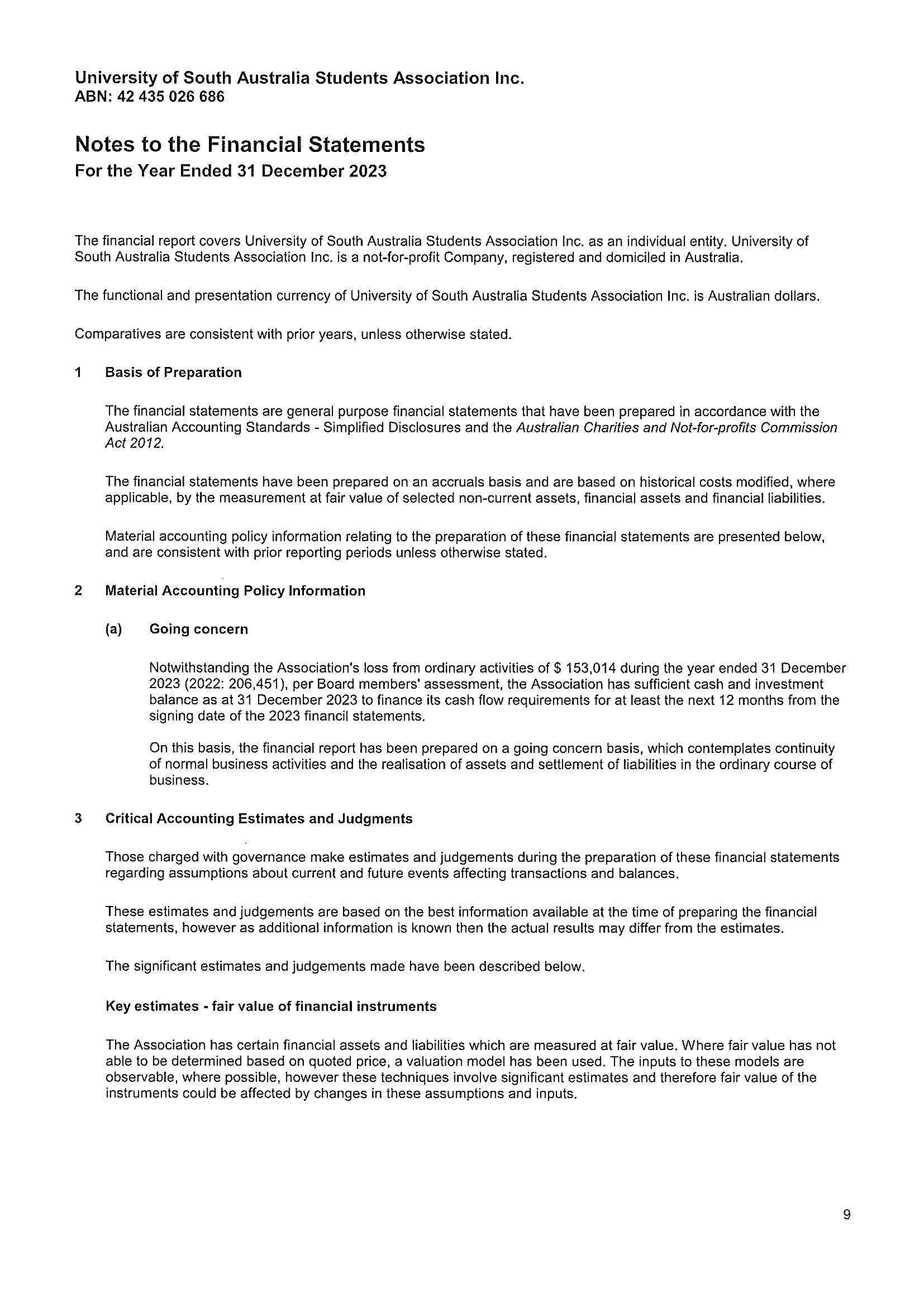
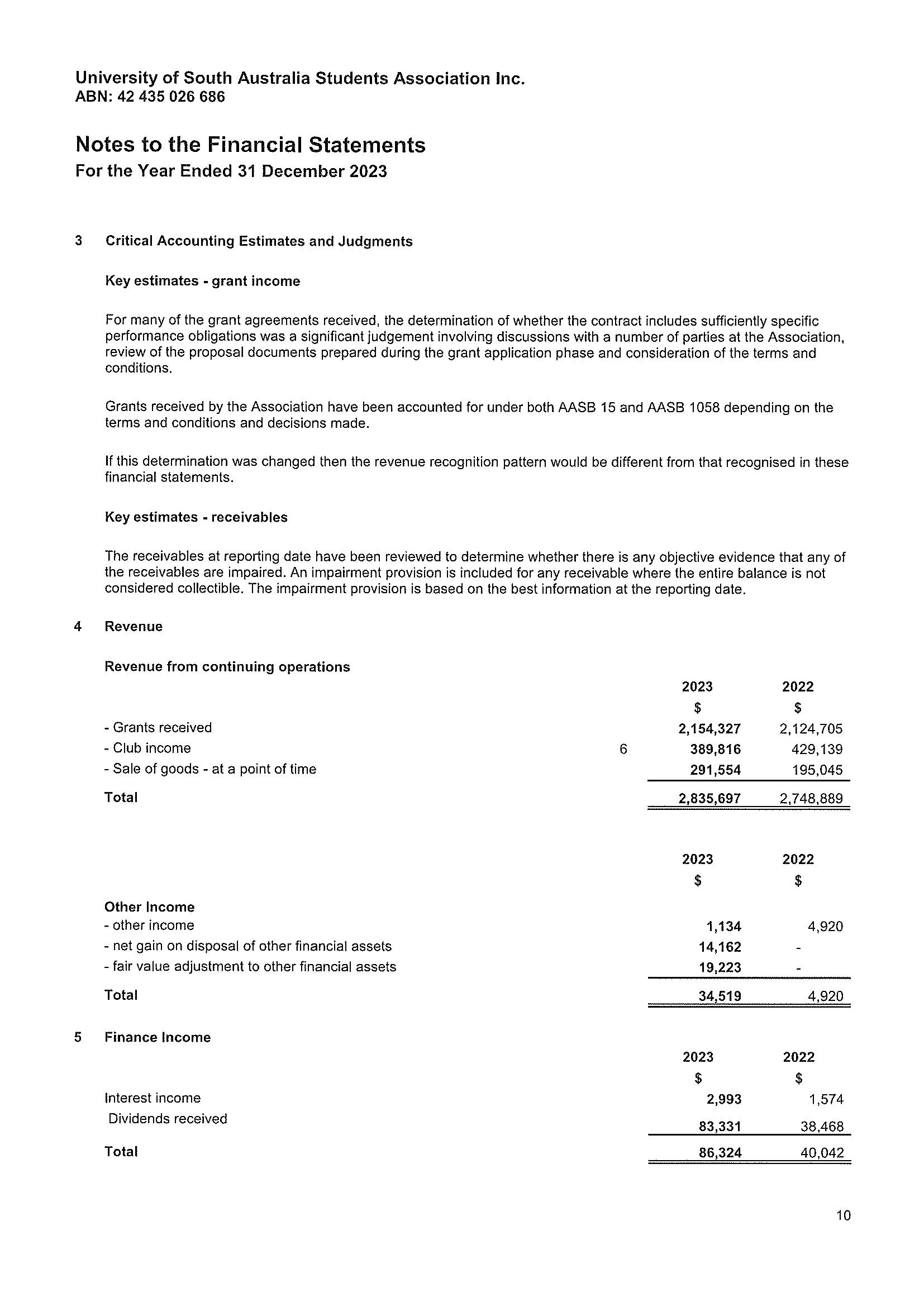
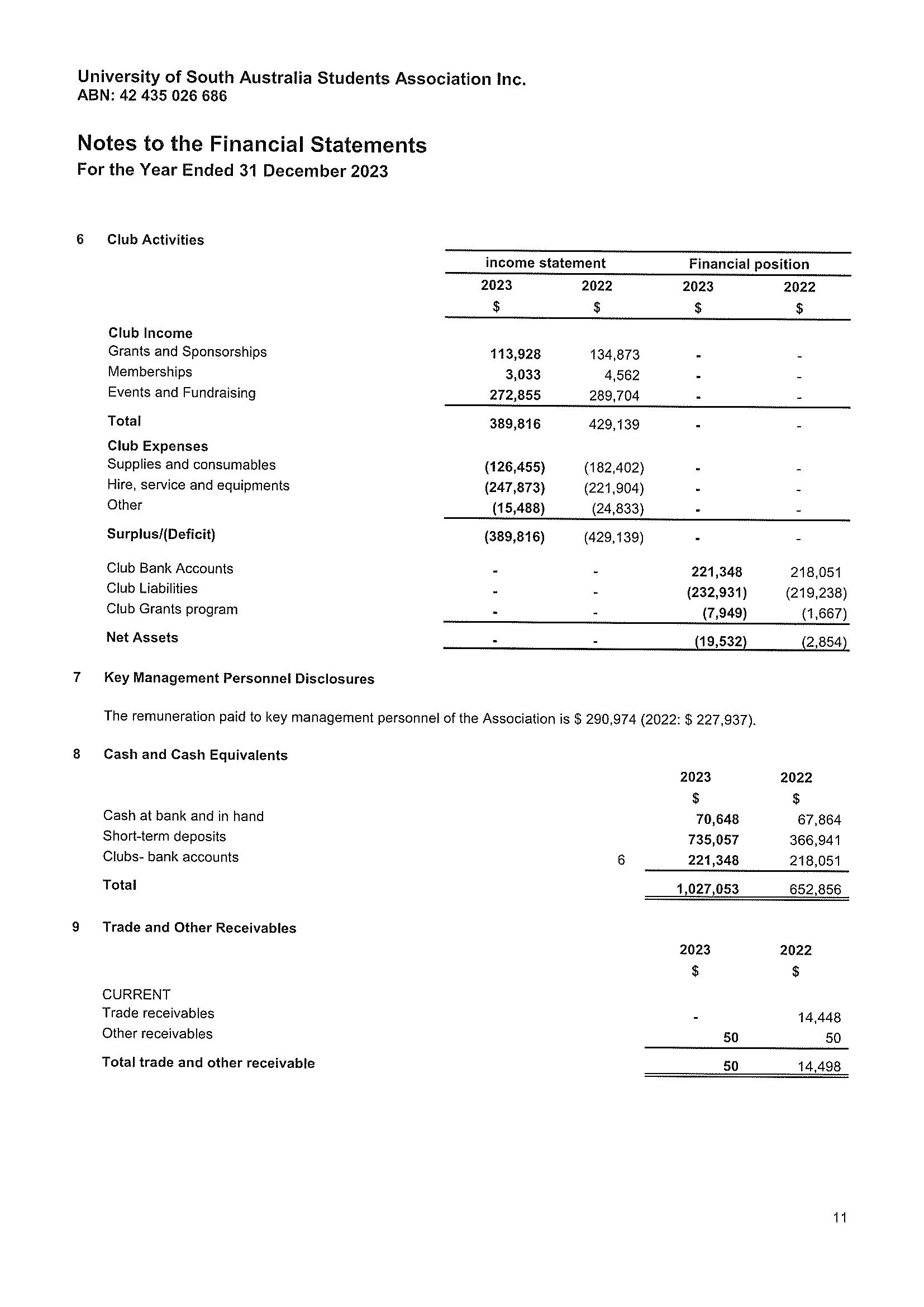
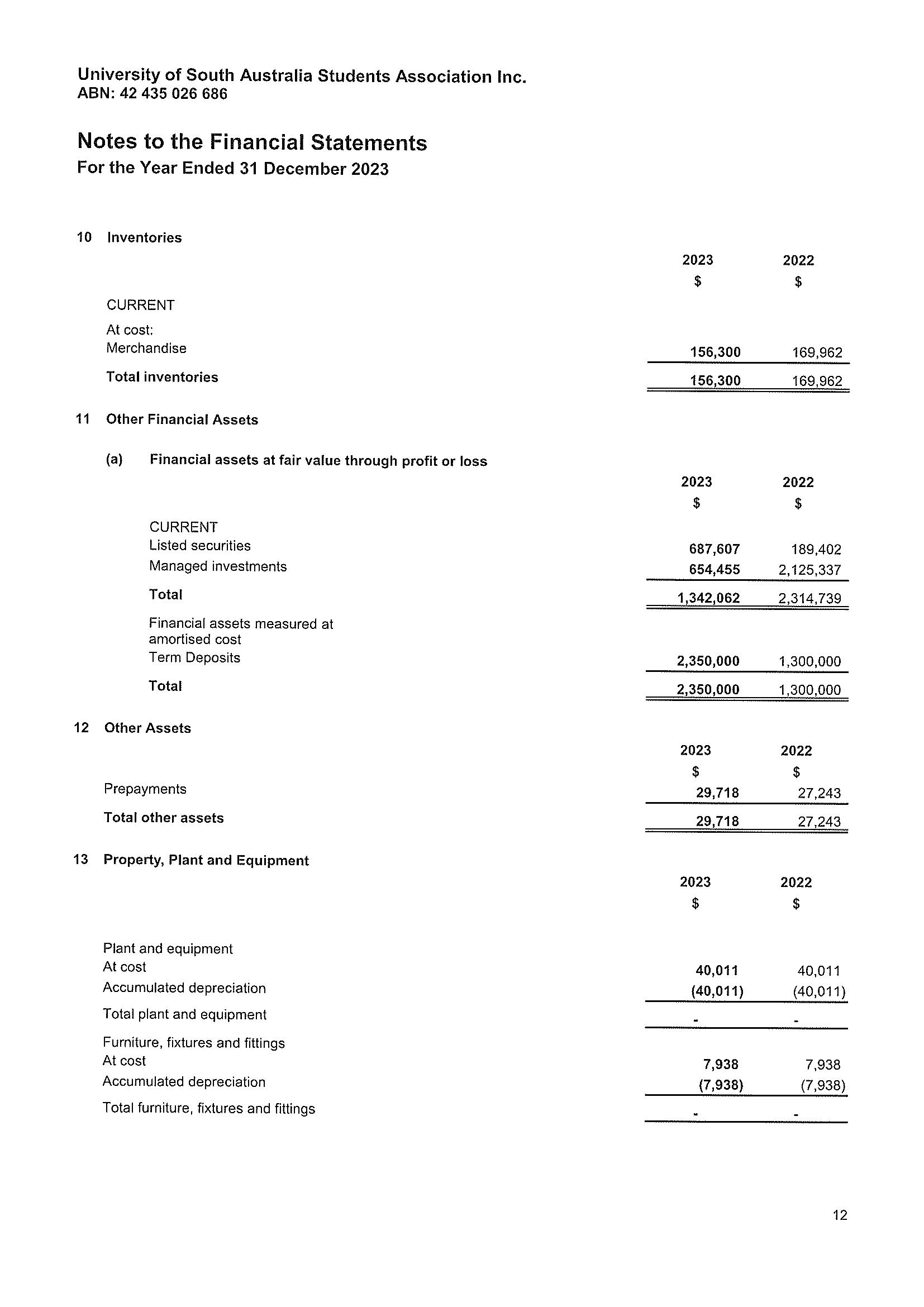
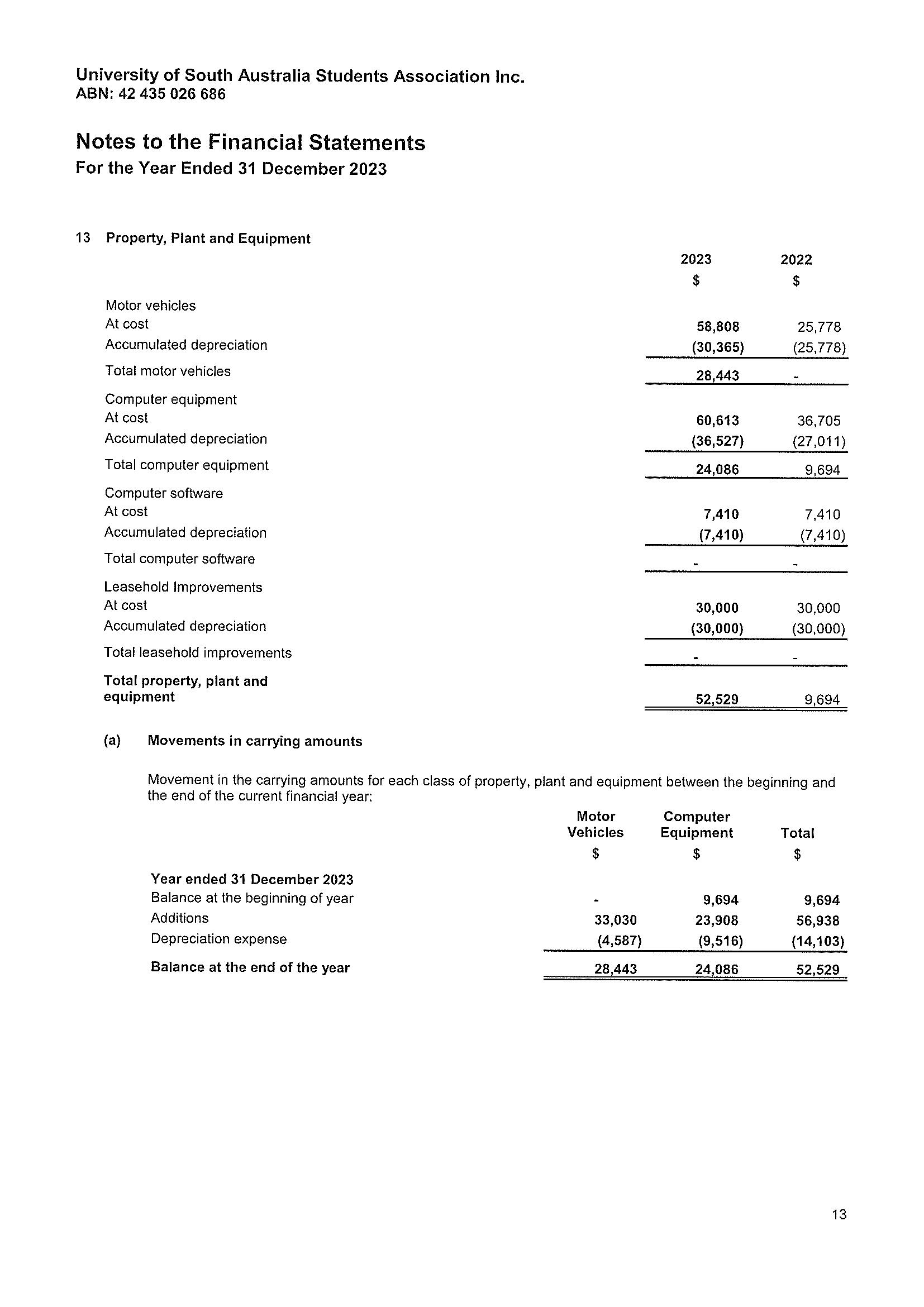
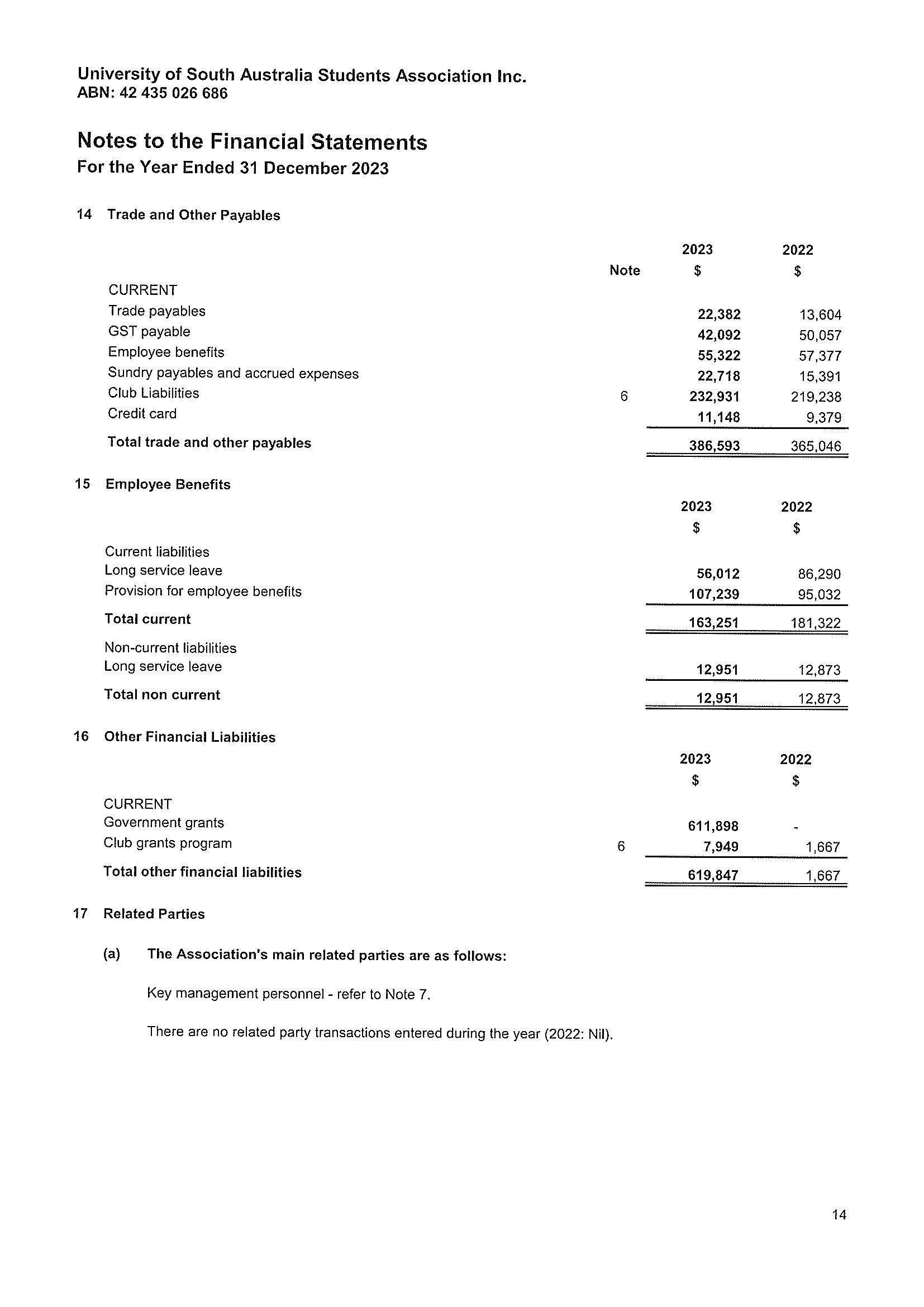
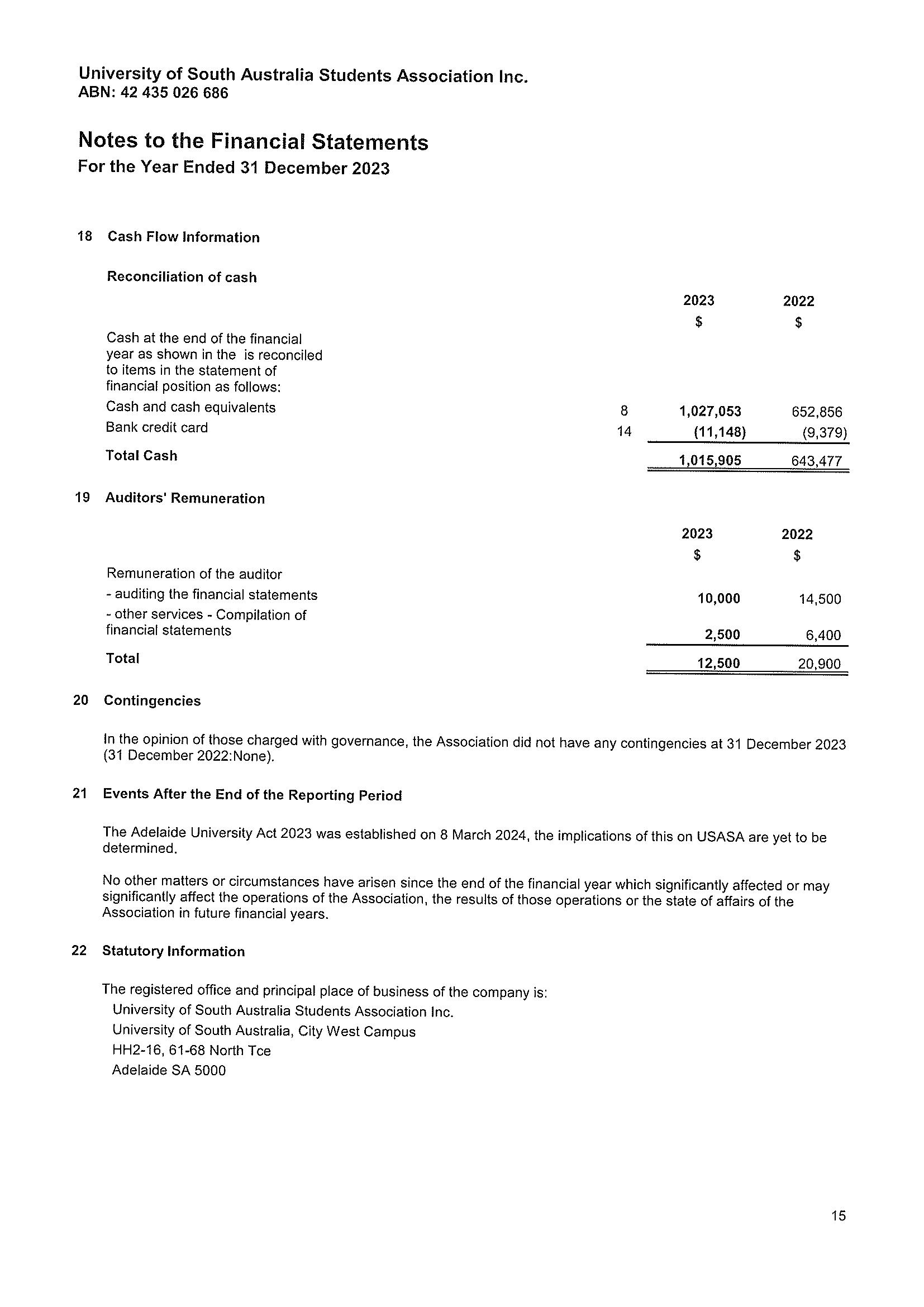
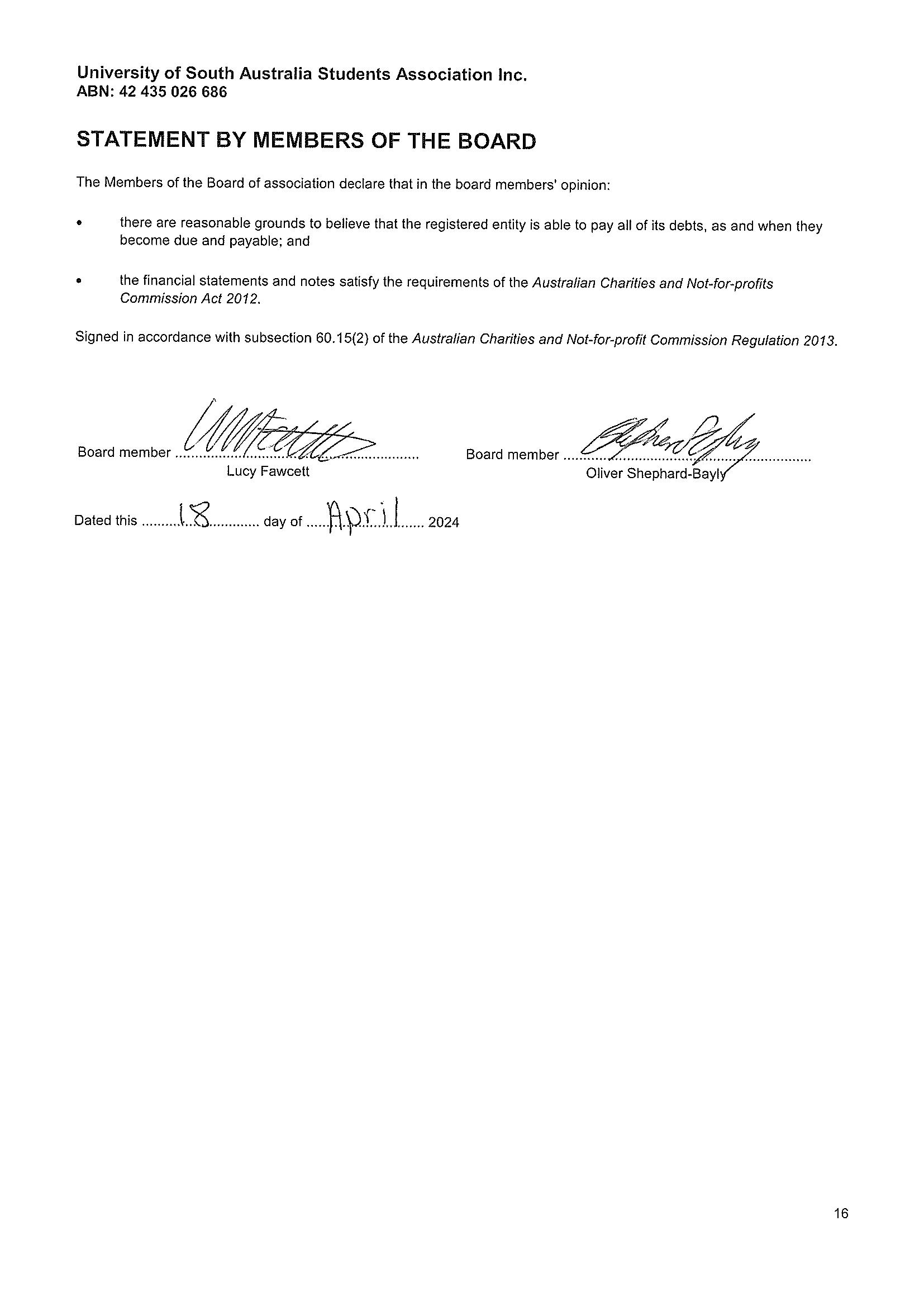

We have audited the financial report of University of South Australia Student Association Inc (“the Association”), which comprises the statement of financial position as at 31 December 2023, the statement of comprehensive income, statement of changes in equity and statement of cash flows for the year then ended, and notes to the financial statements, including a summary of significant accounting policies and director’s declaration
In our opinion, except for the possible effects of the matters described in the Basis for Qualified Opinion paragraph, the financial report of University of South Australia Student Association Inc has been prepared in accordance with Division 60 of the Australian Charities and Not-for-profits Commission Act 2012, including:
giving a true and fair view of the registered Association’s financial position as at 31 December 2023 and of its financial performance and cash flows for the year ended on that date; and
complying with Australian Accounting Standards, and Division 60 of the Australian Charities and Not-for-profits Commission Regulation 2013
We were unable to obtain sufficient and appropriate audit evidence on the Association’s opening balances as at 1 January 2023 and as a result we were unable to determine whether adjustments to the results of operations and opening retained earnings might be necessary for 2023 and the possible effects of this on the comparability of the current period’s figures and the comparative figures.
We conducted our audit in accordance with Australian Auditing Standards. Our responsibilities under those standards are further described in the Auditor's Responsibilities for the Audit of the Financial Report section of our report. We are independent of the Association in accordance with the ethical requirements of the Accounting Professional and Ethical Standards Board's APES 110 Code of Ethics for Professional Accountants (the Code) that are relevant to our audit of the financial report in Australia. We have also fulfilled our other ethical responsibilities in accordance with the Code and the independence requirements of Division 60-40 of the AustralianCharitiesandNot-for-profitsCommission Act 2012.
We believe that the audit evidence we have obtained is sufficient and appropriate to provide a basis for our opinion.
Other Matter
The financial report of the Association for the year ended 31 December 2022 was audited by another auditor who expressed an unmodified opinion on the financial report on 28 March 2023.
Responsibilities of Management and Those Charged with Governance for the Financial Report
Management is responsible for the preparation and fair presentation of the financial report in accordance with the financial reporting requirements of the Australian Accounting Standards and Australian Charities and Not-for-profits Commission Act 2012 and for such internal control as management determines is necessary to enable the preparation and fair presentation of a financial report that is free from material misstatement, whether due to fraud or error.

Responsibilities of Management and Those Charged with Governance for the Financial Report (continued)
In preparing the financial report, management is responsible for assessing the Association's ability to continue as a going concern, disclosing, as applicable, matters relating to going concern and using the going concern basis of accounting unless management either intends to liquidate the Association or to cease operations, or has no realistic alternative but to do so.
Those charged with governance are responsible for overseeing the Association's financial reporting process.
Our objectives are to obtain reasonable assurance about whether the financial report as a whole is free from material misstatement, whether due to fraud or error, and to issue an auditor's report that includes our opinion. Reasonable assurance is a high level of assurance but is not a guarantee that an audit conducted in accordance with the Australian Auditing Standards will always detect a material misstatement when it exists. Misstatements can arise from fraud or error and are considered material if, individually or in the aggregate, they could reasonably be expected to influence the economic decisions of users taken on the basis of this financial report.
As part of an audit in accordance with the Australian Auditing Standards, we exercise professional judgment and maintain professional scepticism throughout the audit. We also:
Identify and assess the risks of material misstatement of the financial report, whether due to fraud or error, design and perform audit procedures responsive to those risks, and obtain audit evidence that is sufficient and appropriate to provide a basis for our opinion. The risk of not detecting a material misstatement resulting from fraud is higher than for one resulting from error, as fraud may involve collusion, forgery, intentional omissions, misrepresentations, or the override of internal control.
Obtain an understanding of internal control relevant to the audit in order to design audit procedures that are appropriate in the circumstances, but not for the purpose of expressing an opinion on the effectiveness of the Association's internal control.
Evaluate the appropriateness of accounting policies used and the reasonableness of accounting estimates and related disclosures made by the directors.
Conclude on the appropriateness of the directors' use of the going concern basis of accounting and, based on the audit evidence obtained, whether a material uncertainty exists related to events or conditions that may cast significant doubt on the Association's ability to continue as a going concern. If we conclude that a material uncertainty exists, we are required to draw attention in our auditor's report to the related disclosures in the financial report or, if such disclosures are inadequate, to modify our opinion. Our conclusions are based on the audit evidence obtained up to the date of our auditor's report. However, future events or conditions may cause the Association to cease to continue as a going concern.
Evaluate the overall presentation, structure and content of the financial report, including the disclosures, and whether the financial report represents the underlying transactions and events in a manner that achieves fair presentation.
Auditor's Responsibilities for the Audit of the Financial Report (continued) We communicate with the directors regarding, among other matters, the planned scope and timing of the audit and significant audit findings, including any significant deficiencies in internal control that we identify during our audit.


LUKE BOLLMEYER DIRECTOR
Adelaide, 22 April 2024